Many businesses recognize the impact of CFO services, yet only a fraction uses them. Firms working with fractional CFOs report up to a 20% increase in profit. As companies aim for sustainability, CFO expertise becomes essential.
An outsourced CFO delivers actionable insights to businesses preparing for capital raises or pursuing M&A. CFO services enhance transparency, stronger investor relations, and a forward‑looking strategy.
Why Long-Term Growth Requires Financial Leadership
Seamless alignment from strategy to actionable planning drives long-term business success. Active financial leadership sets direction, maintains control, and builds investor trust.
The Role of CFO Services in Shaping Business Vision
To achieve long-term growth, consider how CFO expertise brings clarity and guidance:
- CFO services help align financial strategy with the overarching business vision.
- Reinforce robust internal controls and accurate financial statements.
- With effective bookkeeping and payroll, CFO services support structural alignment.
- Transparent and well-structured reporting enhances credibility for potential capital raises or M&A readiness.
Why Financial Statements Matter for Sustainable Decisions
Accurate financial statements are foundational for the better impact of CFO services, offering insights into profitability, liquidity, and operational trends. These reports enable business leaders to set informed budgets.
Moreover, consistent reporting reveals performance patterns for companies with CFOs who aim for long-term business growth. CFOs use this data to align financial strategy with business goals and prepare for audits, capital raises, or expansion.
Establishing Internal Controls for Long-Term Stability
Satisfactory control can protect assets, enhance financial statement accuracy, and create long-term business growth. CFOs ensure efficient operations through preventative checks and monitoring.
Auditors found 53 serious problems in how some big organizations handle their financial reporting. These issues show that when proper checks aren’t in place, mistakes or fraud can easily occur.
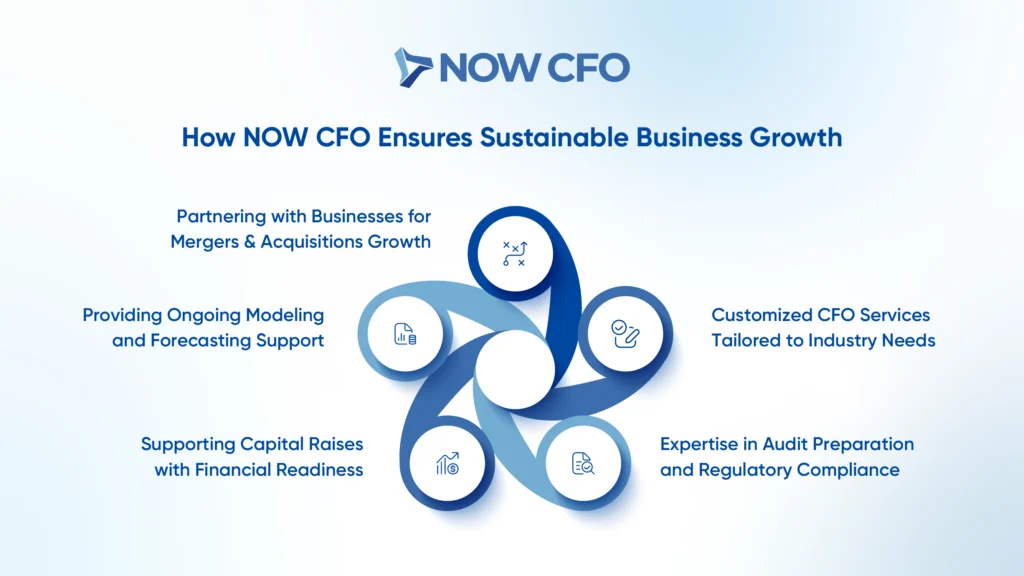
Aligning Financial Operations With Growth Objectives
Effective alignment of financial operations with your company’s expansion goals transforms financial strategy into a growth engine. CFOs embed this alignment by linking budgets, forecasts, and resource deployment with measurable business milestones.
Through a finance strategy, companies can transform operational data into strategic insights and inform investment decisions that align with their long-term vision. Businesses can achieve a lasting impact through tailored financial leadership by consistently monitoring performance.
Building Investor Trust Through Financial Transparency
CFOs play a critical role in enhancing transparency. Financial transparency is the foundation for building investor trust. Today, investors demand more than just balance sheets; they seek assurance that the company operates with integrity.
CFOs help businesses create reports highlighting performance trends, risk exposure, and strategic opportunities. These reports present a consistent narrative of financial health and alignment with vision.
Strategic Benefits of CFO Services for Long-Term Success
Transitioning from the strategic importance of financial leadership, exploring how CFO services turn vision into action is crucial.
Annual Operating Plans that Support Growth Strategies
Annual operating plans lay the actionable roadmap essential for sustainable business expansion:
- Set clear, measurable annual financial goals linked to your long-term vision.
- Align departmental budgets with strategic priorities to ensure efficient resource utilization.
- Provide quarterly performance checkpoints to adapt proactively.
- Integrate regulatory compliance into financial scheduling.
Leveraging Forecasting and Modeling for Market Adaptability
Financial forecasting and modeling are vital tools that enhance strategic planning and decision-making. These models serve as the backbone for businesses, enabling them to anticipate trends, evaluate scenarios, and adjust their strategies promptly.
CFOs drive long-term business growth through robust financial modeling. They also align projections with strategic goals and ensure that planning remains responsive and data-backed.
Moreover, CFOs model revenue, costs, and cash flows under multiple scenarios. Forecasting supports finance teams by enabling them to stress-test budgets and optimize capital deployment.
How CFO Services Improve Audit Preparation and Compliance
CFO services elevate and improve audit preference by embedding rigorous audit protocols. They design financial systems that streamline documentation, maintain regulatory alignment, and facilitate timely audits.
Moreover, financial statement audits have improved operational readiness. A financial report enhances transparency, accountability, and asset management, underscoring the importance of audit preparation.
Scaling Bookkeeping and Payroll Systems Effectively
As companies grow, manual financial processes become unsustainable. CFOs implement integrated systems that automate bookkeeping and payroll, reduce human error, and maintain compliance.
Moreover, these improvements ensure efficient workflows, timely reporting, and real-time visibility into costs and liabilities. With robust systems, businesses can reallocate resources, streamline audits, and manage compensation efficiently.
Positioning Companies for Mergers & Acquisitions
Worldwide, the number of M&A dropped by 9% in the first half of 2025 compared to the same period in 2024. However, the total value of those deals increased by 15%, showing that while there were fewer deals, they were larger and more valuable.
Connecting operational readiness with strategic expansion also prepares businesses to capitalize on merger and acquisition (M&A) opportunities. This strategy can:
- Show clean, scalable financial records to attract buyers.
- Align financial metrics with growth narratives to leverage negotiation.
- Stress-test forecasts to project post‑acquisition performance.
CFO Services and Their Role in Business Transformation
CFO services can shift financial management from reactive responses to a proactive, growth-focused strategy.
Transitioning From Reactive to Proactive Financial Management
CFO services deliver actual value by replacing reactive financial fixes with forward-thinking strategies that anticipate challenges and drive growth. CFOs also implement early-warning systems, forecast future scenarios, and guide resource allocation ahead of demand.
Through scenario planning and rolling forecasts, companies adapt swiftly to market shifts, regulatory changes, or evolving customer behaviors. CFOs embed financial strategy and CFO support into decision-making, ensuring operations align with future goals.
Supporting Capital Raise with Strategic Financial Planning
Most of the capital raised is allocated to larger investment funds, making it more challenging for individual businesses to secure funding in this highly competitive environment. What the CFO does in this situation is:
- Craft detailed financial models that align fundraising with expansion goals.
- Forecast transparent cash flow for investor confidence.
- Maintain compliance with fundraising regulations and disclosures.
- Coordinate due diligence documentation for a smooth capital process.
Driving Efficiency in Business Accounting Functions
Relating proactive financial transformation to operational precision ensures every dollar is tracked effectively and supports long‑term growth.
- Implement cloud-based systems to centralize records and reduce duplication.
- Automate reconciliations to cut manual errors and save time.
- Standardize the chart of accounts for consistency across departments.
- Embed automated alerts for anomalies, improving oversight.
Enhancing Reporting to Meet SEC Compliance Standards
CFOs strengthen reporting frameworks to meet SEC accuracy. They also boost benefits via compliance, reliability, and credibility.
Using advanced tagging systems like Inline XBRL, CFOs can enhance transparency. This transparency ensures timeliness in filings and reduces error exposure, which is critical for outsourced CFO services to achieve scalability and regulatory resilience.
Optimizing Resource Allocation for Future Expansion
Integrating insight with action, CFOs guide deploying smart resources that fuel long-term business growth. Moreover, allocating resources effectively sets the groundwork for sustainable expansion and operational resilience.
CFOs analyze investments, prioritize spending, and redirect funds toward high-yield areas. Strategic allocation supports company growth, ensuring resources are channeled toward initiatives that scale efficiently.
How NOW CFO Ensures Sustainable Business Growth
NOW CFO’s unique strength is the ability to deliver customized CFO services tailored to industry needs.

How NOW CFO Ensures Sustainable Business Growth
- Customized CFO Services Tailored to Industry Needs
- Expertise in Audit Preparation and Regulatory Compliance
- Supporting Capital Raises with Financial Readiness
- Providing Ongoing Modeling and Forecasting Support
- Partnering with Businesses for Mergers & Acquisitions Growth
Customized CFO Services Tailored to Industry Needs
Many businesses outsource roles such as CFOs to gain cost efficiency and flexibility, reflecting the demand for specialized expertise. Delivering targeted financial expertise differentiates NOW CFO by aligning strategy with sector-specific needs.
- Adapt financial frameworks to sector-specific risks and regulations.
- Align performance metrics with your industry’s growth triggers.
- Use specialized forecasting models unique to your market.
- Integrate tailored internal controls to meet the standards of your industry.
Expertise in Audit Preparation and Regulatory Compliance
NOW CFO designs audit documentation and compliance systems that align with industry standards and regulatory deadlines. This report reduces risk, enhances reporting accuracy, and enables long-term business growth.
CFOs apply financial strategy and support to map norm changes, update controls, and coordinate audit-ready workflows. Highlighting how they deliver trust and credibility essential for scalability and investor readiness.
Supporting Capital Raises with Financial Readiness
CFOs coordinate capital readiness through precise planning, compliance, and forecasting. Businesses seeking long-term growth rely on CFO-led modeling and documentation to engage investors strategically.
Through tailored presentations, accurate cap tables, and runway analyses, all align to strengthen funding negotiations. CFOs position the company as a credible, growth-ready partner, demonstrating how outsourced CFO services help companies grow.
Providing Ongoing Modeling and Forecasting Support
Continuous modeling and forecasting create adaptability through informed strategy.
- Update rolling forecasts regularly to respond to market shifts.
- Model scenarios for demand changes, budgets, and cash flow stress tests.
- Incorporate real-time internal and external data for agility.
- Track forecast accuracy and refine assumptions proactively.
Partnering with Businesses for Mergers & Acquisitions Growth
M&A brings companies together with financial readiness and strategic opportunity.
- Prepare detailed financial presentations to support valuation discussions and analysis.
- Ensure clean due diligence by organizing documentation proactively.
- Coordinate with legal and compliance teams to navigate antitrust guidelines.
Conclusion: Why Investing in CFO Services Pays Off Long Term
Understanding the impact of CFO services isn’t just about improving numbers, it’s about securing your business in financial clarity. The insights shared here illustrate how CFO services drive long‑term business growth with CFO services.
If you’re ready to elevate your company’s growth potential, NOW CFO offers a tailored free consultation to suit your stage and industry. Whether you’re preparing for funding, optimizing operations, or planning an acquisition, we stand ready to partner with you.
Frequently Asked Questions
What are the Key Benefits of Using CFO Services for Long-Term Business Growth?
CFO services offer strategic financial planning, enhance reporting accuracy, improve compliance, and help align operations with growth objectives. These strategies contribute to sustainable, scalable business success.
How do Outsourced CFO Services Differ From Hiring a Full-Time CFO?
Outsourced CFOs offer flexible, cost-effective expertise tailored to your needs, while full-time CFOs are permanent hires with broader internal responsibilities. Outsourced solutions are ideal for scaling businesses or those preparing for capital events.
How can CFO Services Support my Business During a Capital Raise or Acquisition?
CFOs ensure your financials are investor-ready and prepare detailed forecasts. CFOs also manage due diligence and align valuation with the strategic growth report.
What Industries Benefit most from strategic CFO services?
CFO services are valuable across sectors, but especially in industries facing rapid growth, stringent regulatory requirements, or complex forecasting needs, such as technology, healthcare, manufacturing, and professional services.
When is the Right Time to Bring in Outsourced CFO Services?
The right time is when your business is growing, preparing for funding, facing compliance challenges, or lacks internal financial leadership. Early engagement ensures better planning and reduced risk.
Cost-saving strategies CFO services can implement aren’t just about cutting back, they’re about spending smarter. A good CFO looks at where your money is going, finds the waste, and helps you keep more profits without hurting the business.
Many companies try to save money by making quick cuts, often leading to bigger problems. A smarter approach is to focus on what’s driving up your costs and fix those areas with a plan.
Review Contracts for Savings
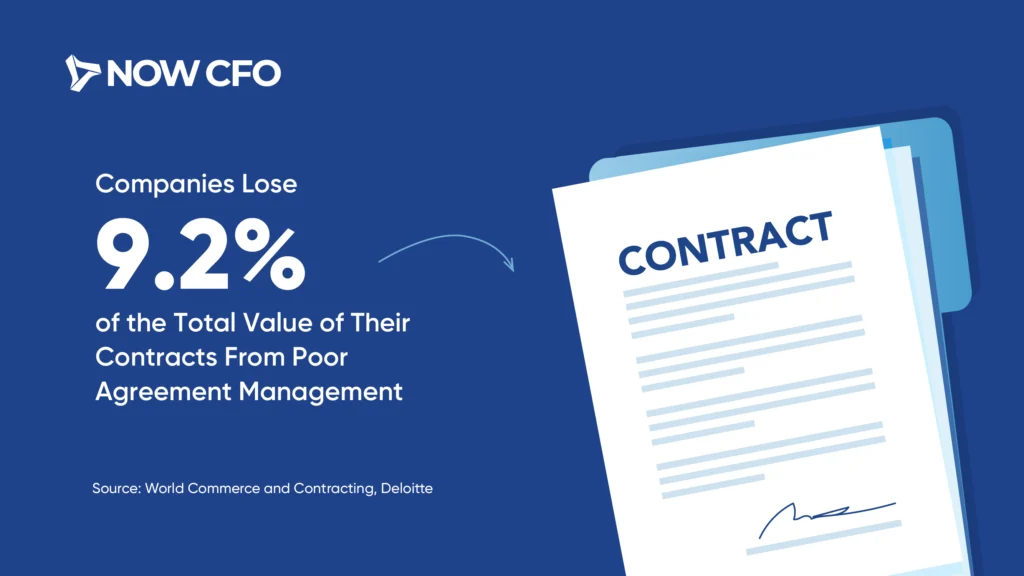
Companies lose about 9.2% of a contract’s value just from not managing agreements well. Missed details, unclear terms, or forgotten renewal dates can quietly drain money without anyone noticing.
CFOs review contracts regularly, catch hidden charges, and work to get better deals. With the proper financial oversight, your business can avoid waste, cut costs, and get more value from every agreement.
Source: World Commerce and Contracting, Deloitte
Optimizing Budget Allocation
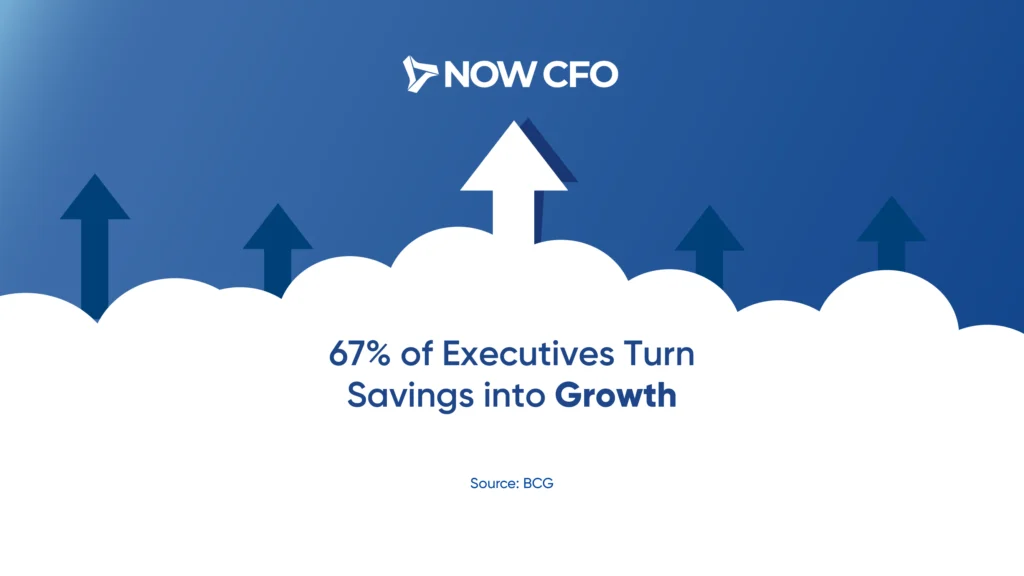
67% of executives reinvest cost savings into other business areas, showing that reducing expenses isn’t just about cutting back but driving smarter growth. When budgets are aligned with strategic goals, companies can amplify returns without increasing total spending.
Additionally, financial efficiency strategies play a key role in this shift. By analyzing past spending and forecasting future needs, CFOs help businesses reallocate resources to the highest-impact areas.
Source: BCG
Reducing Overhead Costs
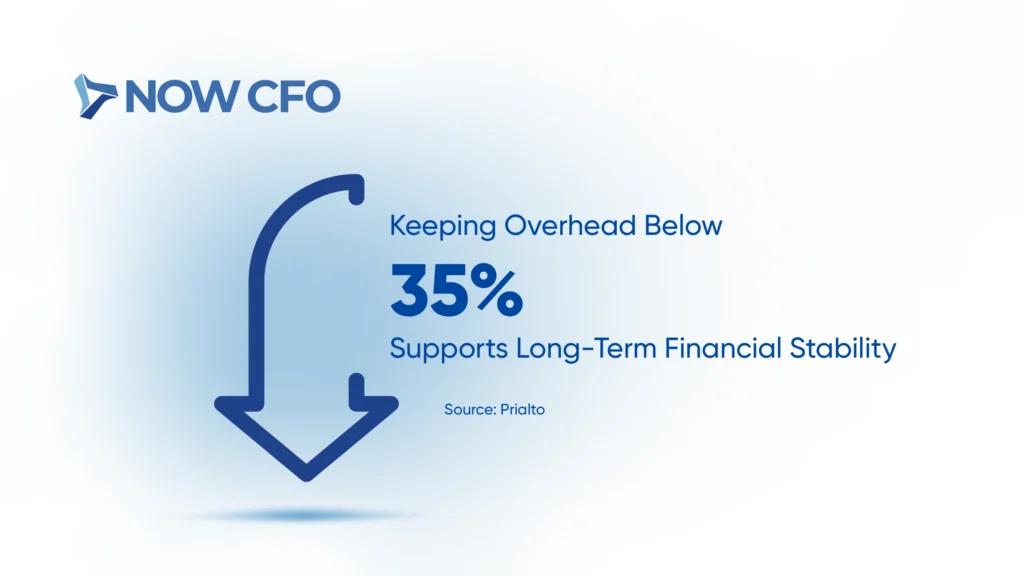
Strong companies aim to keep overhead costs below 35% of total revenue. Staying within this range helps protect profit margins and creates financial stability, especially during periods of growth or uncertainty.
Fractional CFO savings support this goal by reviewing non-operational expenses, such as administrative, office, and support costs. They also help identify areas where spending can be reduced without disrupting daily operations.
Source: Prialto
Using Technology & Automation

79% of CFOs plan to increase AI budgets, and 94% believe generative AI will significantly benefit at least one area of finance. This shift shows how automation is becoming essential to improving accuracy, cutting costs, and streamlining reporting.
Cost management practices can guide companies through this transition by selecting the right tools. CFOs also help customize automation strategies and ensure seamless integration with existing systems.
Source: Bain Capital Ventures
Monitor Cost Drivers to Sustain Savings
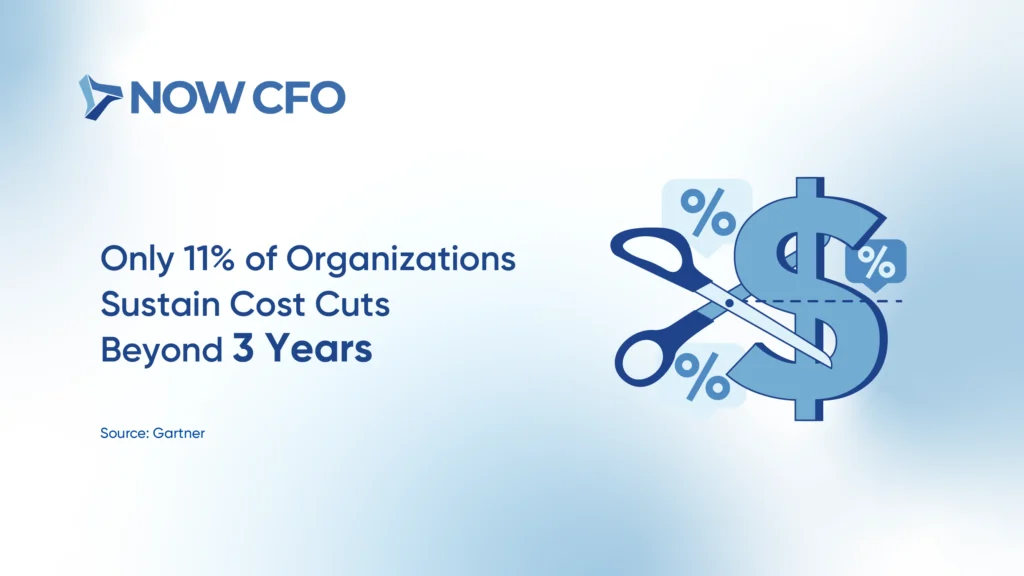
Only 11% of organizations sustain cost reductions beyond three years. This finding highlights a significant challenge: short-term cuts rarely last unless businesses actively monitor what’s driving their expenses.
CFO services regularly check where your money is going, spot areas where costs are creeping up, and make changes before minor problems become big. This constant attention keeps savings in place and helps your business stay financially healthy.
Source: Gartner
Conclusion
Cost-saving strategies CFO services can implement are all about making your business run better without wasting money. Instead of guessing where to cut back, a CFO helps you find real ways to save.
If you’re ready to see where your business can save money and improve how it runs, we’re here to help. You can book a free strategy session! Let’s work together to make your business leaner, stronger, and more profitable, without cutting corners.
Frequently Asked Questions
How can CFO services spot hidden financial inefficiencies?
CFOs use financial reporting, trend analysis, and benchmarking to uncover areas where money is wasted, such as outdated systems, duplicate subscriptions, or poorly negotiated contracts.
What’s the difference between cutting costs and improving cost efficiency?
Cutting costs often means reducing spending across the board. Improving cost efficiency focuses on getting more value from every dollar spent, such as streamlining processes, improving vendor terms, or reallocating budgets to high-performing areas.
Are outsourced CFOs effective for smaller businesses trying to save money?
Yes, outsourced CFOs offer high-level expertise without the full-time salary burden. They bring experience from various industries and can quickly identify savings opportunities tailored to a company’s size and stage.
How soon can a business expect results from CFO-led cost-saving strategies?
Some savings, like renegotiated contracts or automation, can be realized within weeks. Others, such as tax restructuring or strategic budget shifts, may take a quarter or more to fully reflect in the financials.
What tools do CFOs use to monitor and control business spending?
CFOs often rely on dashboards, ERP systems, and AI-powered analytics to track spending in real time, ensuring that cost controls stay in place and that trends are caught early.
Competitive businesses understand that financial clarity isn’t just about balancing the books, but also about enabling smart, scalable growth. The benefits of CFO services go far beyond traditional accounting by offering expert guidance on cash flow, risk, funding, and strategic forecasting.
With markets becoming increasingly unstable and decision-making cycles faster than ever, having the right financial partner is crucial. CFO services offer executive-level insight tailored to a company’s stage, industry, and goals.
CFOs Retire Above the Average Age
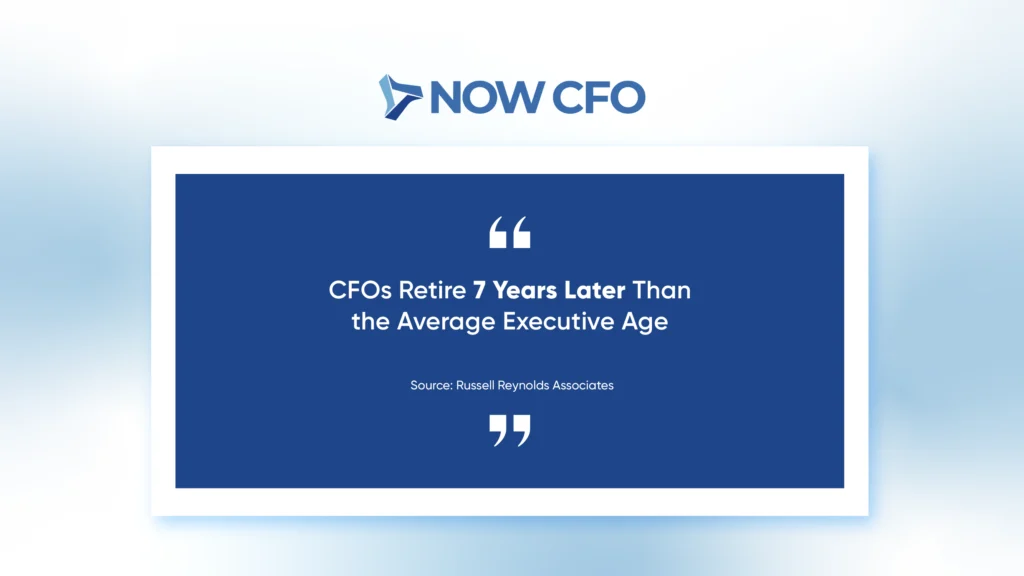
56 percent of CFOs who leave their roles either retire or move into board positions, the highest rate recorded in the past 7 years. This trend highlights how much companies value their CFOs’ experience and continue to rely on their strategic guidance.
A CFO provides this same depth of leadership daily. Unlike external advisors, a full-time CFO is deeply embedded in the company’s operations, aligning strategy, risk management, and financial planning with long-term goals.
Source: Russell Reynolds Associates
Strong Internal Succession Builds Financial Continuity
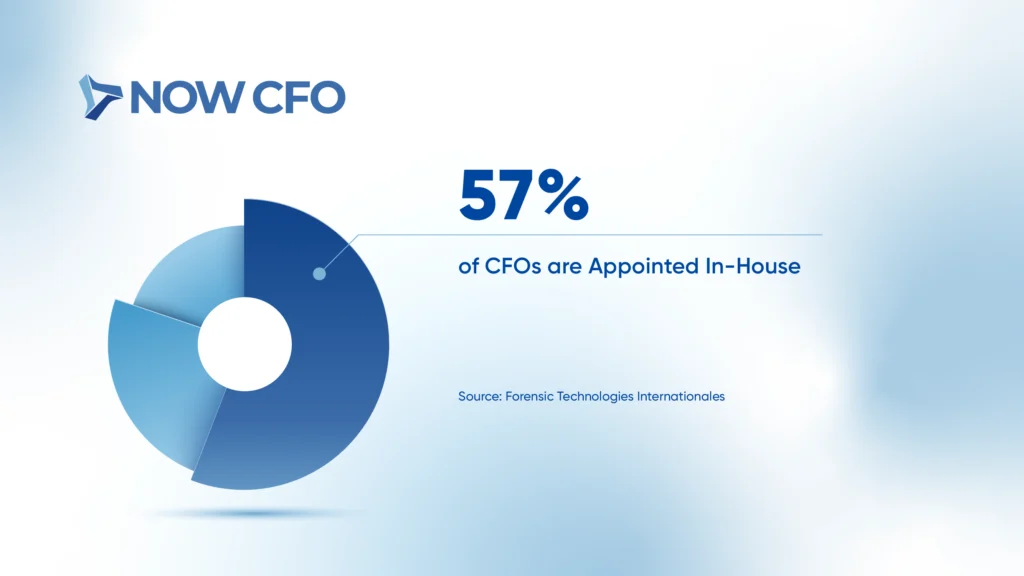
57% of global incoming CFOs were appointed internally. This trend shows that organizations with financial leaders are better positioned for smooth succession, ensuring continuity and stability at the executive level.
A CFO strengthens the leadership pipeline for tomorrow. By grooming internal talent, companies reduce disruption, preserve institutional knowledge, and maintain consistent financial oversight.
Source: Russell Reynolds Associates
Beyond Finance: CFOs as Enterprise-Wide Strategists
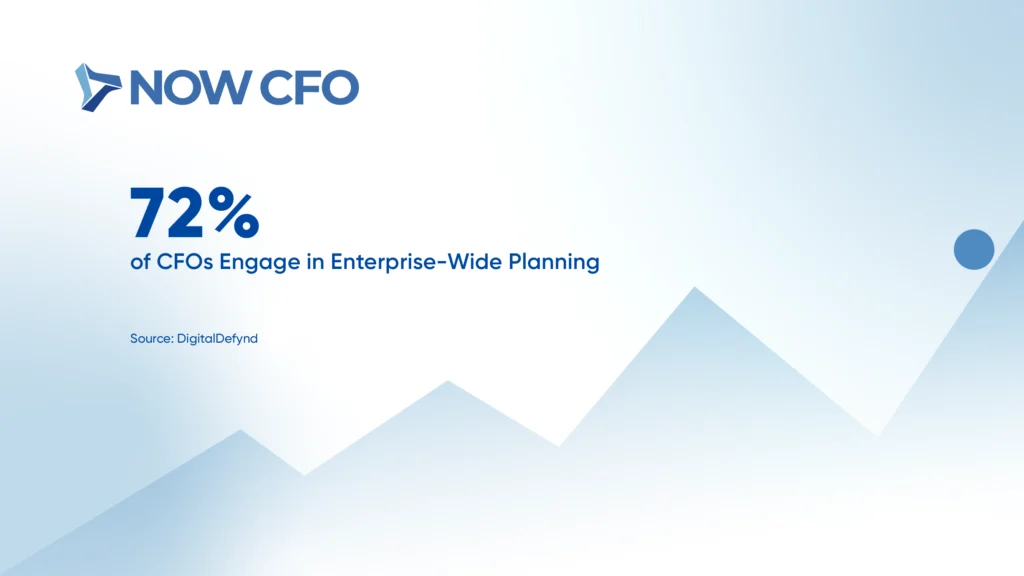
CFOs today do much more than manage finances. In fact, 72% of them now lead strategic planning across the entire organization, not just within the finance department.
Moreover, CFO play a hands-on role in shaping business direction and driving execution. By embedding financial discipline into daily decisions, CFOs help companies stay focused and aligned with long-term objectives.
Source: DigitalDefynd
Using AI and Analytics for Smarter Decisions
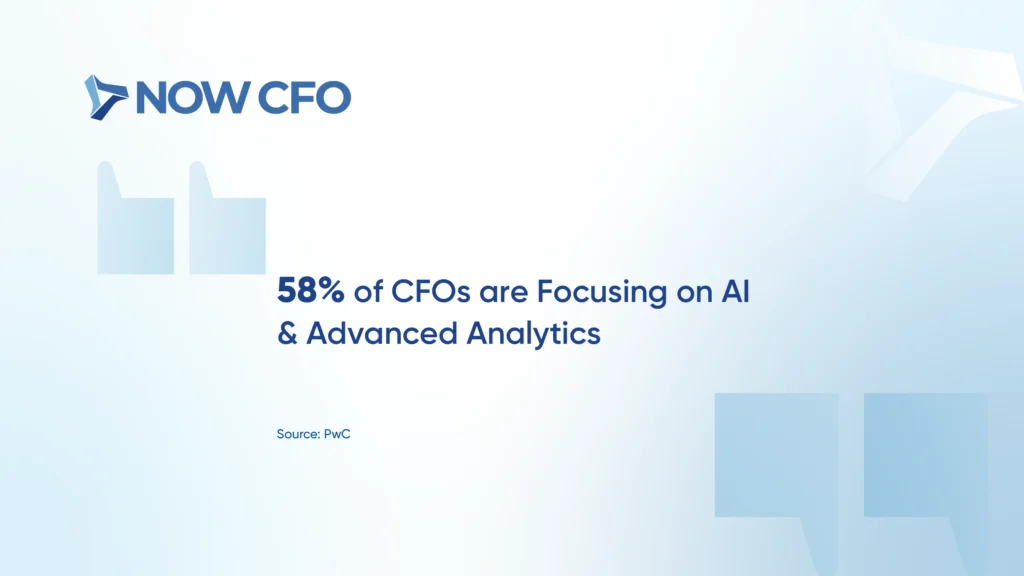
CFOs are increasingly becoming technology leaders, not just financial stewards. 58% of CFOs invest in AI and advanced analytics to adjust planning in today’s volatile environment.
CFOs ensure that these technology investments align directly with the company’s strategy. Embedding AI-driven analytics into financial planning enables more agile responses to shifting market conditions, regulatory pressures, and evolving customer demands.
Source: PwC
Technology as a Cost-Reduction Priority
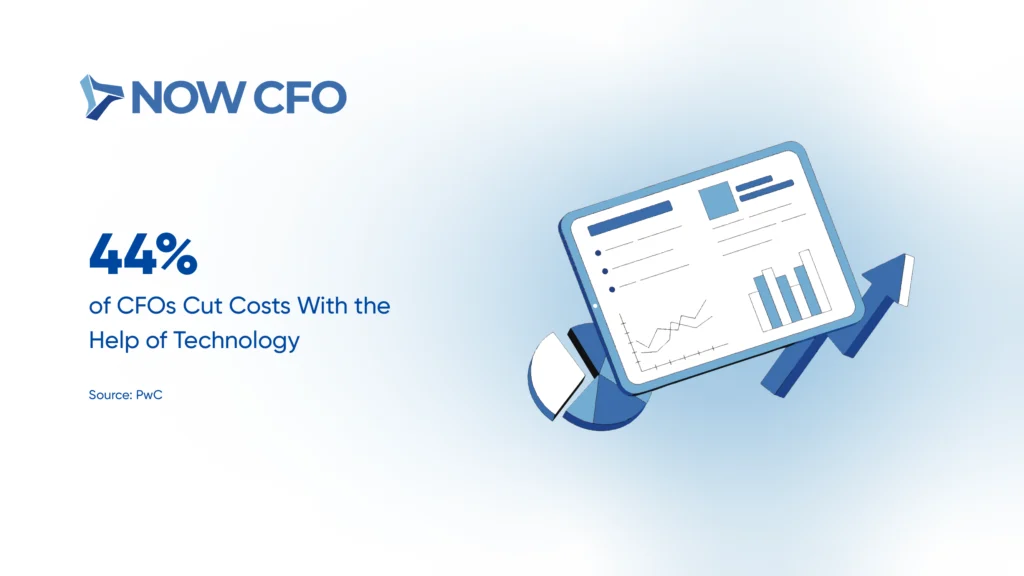
CFOs are placing technology at the core of their cost management strategies. In fact, 44% of CFOs identified expanding technology use to cut costs as a top funding priority for the next 12 months.
As financial leaders, CFOs guide these technology investments to ensure they align with the company’s broader financial goals. By balancing cost reduction with strategic reinvestment, CFOs drive long-term value and position the organization for sustainable growth.
Source: PwC
Capital Allocation Transparency
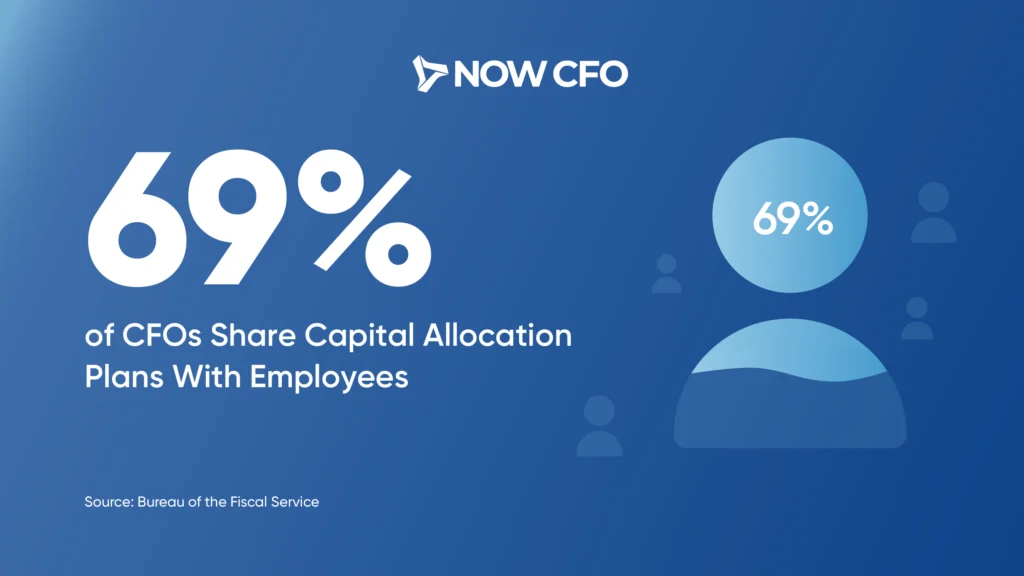
CFOs communicate clearly about capital allocation, enabling employees to understand how the company utilizes its resources. They share these plans to align strategic goals with daily operations, helping teams connect their work to the broader financial picture.
This open communication builds trust and increases engagement across the organization. When employees understand the reasons behind capital decisions, they can actively support key initiatives and contribute to stronger performance and long-term growth.
Source: EY
Conclusion
Ultimately, the benefits of CFO services are grounded not just in numbers but in strategic impact. A visionary CFO brings clarity, financial rigor, and disciplined innovation, all tailored to your business growth.
Ready to amplify your financial horsepower? Explore NOW CFO’s flexible engagement models and schedule a free strategy session for real-time guidance.
Frequently Asked Questions
What Does a CFO Actually Do for a Growing Business?
A CFO helps manage a business’s financial health by overseeing budgeting, forecasting, cash flow, and financial strategy. They also support major decisions, such as fundraising, investments, and cost management, to help the company grow sustainably.
When Should a Business Consider Hiring a CFO?
A business should consider hiring a CFO when it starts scaling, struggles with financial clarity, plans to raise capital, or needs better insight into performance metrics and financial risks.
Are CFO Services Only for Large Companies?
Not at all. Many small and mid-sized businesses use fractional or outsourced CFOs to access senior financial expertise without committing to a full-time salary.
What is the Difference Between a CFO and a Regular Accountant?
An accountant handles day-to-day financial tasks, such as bookkeeping and tax filing. A CFO, on the other hand, focuses on high-level strategy, financial planning, risk management, and long-term goals.
How Can CFO Services Help with Business Growth?
CFO services help identify growth opportunities, enhance decision-making through data-driven insights, manage capital efficiently, and ensure the business is financially prepared to scale.
Understanding what bookkeeping is critical for building financial clarity and making informed business decisions. Yet, 34% of SME owners still manage their company’s books themselves, which heightens the risk of expense misclassification.
When done correctly, bookkeeping does much more than log transactions. Bookkeeping is the backbone for monitoring cash flow, ensuring tax compliance, and producing accurate financial statements.
What is Bookkeeping?
Bookkeeping is the structured process of recording, organizing, and systematically maintaining all business financial transactions. Professional bookkeeping relies on consistency, accuracy, and compliance with financial standards to keep records transparent and reliable.
Definition of Bookkeeping
Bookkeeping is the systematic process of recording and organizing every financial transaction a business undertakes. By capturing purchases, sales, receipts, and payments, bookkeeping is the critical backbone of accounting.
Accurate records show financial health. In fact, 36% of Americans lack financial literacy. Underscoring why business owners need CFOs with strong bookkeeping practices to avoid costly errors and poor decisions.
Learn More: Basics Of Business Bookkeeping
The Role of a Bookkeeper
Bookkeepers are more than record keepers; they are the financial organizers who keep business operations running smoothly.
- Record daily financial transactions to ensure accuracy and consistency.
- Reconcile bank statements to detect errors and discrepancies early.
- Manage accounts payable and receivable to maintain healthy cash flow.
- Prepare financial reports that guide informed business decisions.
- Ensure compliance with tax regulations and reporting requirements.
Key Components of Bookkeeping
To understand bookkeeping, you need to examine its building blocks. These components ensure every transaction is organized and translated into meaningful financial insights.
- Recording Transactions: Systematically log sales, purchases, receipts, and payments.
- Maintaining Ledgers: Organize these transactions into categories like assets, liabilities, equity, revenue, and expenses.
- Managing A/P and A/R: Track what the business owes (payables) and what is owed (receivables).
- Bank Reconciliation: Reconcile bank statements with internal records to spot discrepancies and ensure integrity.
- Financial Reporting: Prepare critical documents like balance sheets, income statements, and cash flow reports.
- Ensuring Accuracy: Compile debit and credit balances from your general ledger into a trial balance.
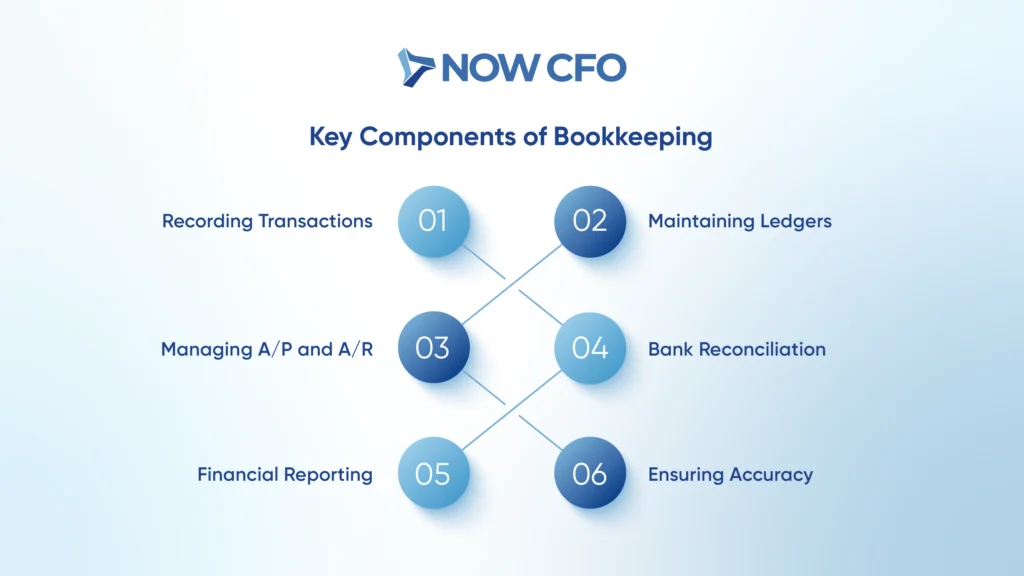
Bookkeeping in Modern Business
Businesses rely on digital solutions to maintain accurate financial record‑keeping. Besides, many SMEs use accounting software, such as QuickBooks, Xero, or Zoho Books, to streamline bookkeeping basics.
Additionally, cloud and electronic systems, endorsed by authorities like the IRS, ensure these digital records meet legal standards and are audit-ready. Such systems enhance tax compliance and reporting by integrating transaction tracking, reporting, and data backup.
Why Bookkeeping is the Backbone of Financial Management
Accurate bookkeeping basics form the foundation for businesses to monitor progress, prepare financial statements, and track deductible expenses effectively. Good records will help you monitor your business’s progress and prepare accurate financial statements.
Moreover, bookkeeping enhances organizing, planning, controlling, and leading, directly supporting management activities. Bookkeeping powers informed decisions, safeguards against financial missteps, and anchors long-term financial stability.
Why is Bookkeeping Important for Businesses?
Bookkeeping is far more than an administrative task; it’s the backbone of financial clarity and accountability. To truly understand what is bookkeeping, business owners must recognize that accurate record-keeping enables informed decision-making.
Proper bookkeeping ensures every transaction is documented, providing a clear view of cash flow, profitability, and liabilities. Without bookkeeping, businesses risk compliance issues, missed opportunities, and financial mismanagement.
Financial Clarity and Decision-Making
Accurate bookkeeping basics give business owners the clarity to assess current performance and chart future direction. With organized financial record‑keeping, owners craft budgets, forecast revenue, and make informed decisions.
Moreover, maintaining clear financial records reduces errors and enhances confidence in decision-making. In fact, nearly 50% of SMEs fail in the first five years, often due to poor financial planning and unclear visibility in cash management.
Tax Compliance and Reporting
Effective financial record-keeping ensures your business meets tax deadlines, accurately reports income, and claims rightful deductions. By maintaining organized records, business owners support tax compliance and reporting confidently.
Integrating bookkeeping into your routine ensures financial clarity, supports smooth audits, and safeguards against missed deductions and penalties. This strengthens your operation’s stability and fuels data-driven decisions.
Tracking Business Performance
One of the clearest ways to see the value of bookkeeping lies in its ability to track business performance. Beyond simply recording transactions, bookkeeping provides the data needed to evaluate profitability, understand spending patterns, and measure growth over time.
- Track monthly income to identify peak seasons, customer behavior, and sales fluctuations.
- Analyze fixed and variable costs to control spending and reduce unnecessary overhead.
- Calculate gross and net profits to assess financial health and long-term sustainability.
- Use historical data to forecast cash needs and build financial plans grounded in actual performance.
- Benchmark your progress with consistent metrics to detect opportunities or early warning signs.
Improving Cash Flow Management
Strong bookkeeping practices are the foundation of effective cash flow management. Accurate records ensure owners know when receivables are due, when payables must be met, and how much working capital is available at any given time.
This financial visibility prevents cash shortages, reduces reliance on costly credit, and allows for timely investments in growth. By tracking expenses and income consistently, businesses can forecast upcoming needs, identify patterns, and take steps to maintain liquidity.
Ensuring Financial Accountability
Companies have higher profitability associated with strong financial accountability practices. Accurate financial record‑keeping promotes transparency and trust, helping stakeholders rely on your information.
Consistent reporting holds management accountable and supports sound decision-making. Additionally, financial accountability fosters compliance with reporting standards and regulatory frameworks, which are essential for your business.
Bookkeeping vs Accounting: What’s the Difference?
While many use the terms interchangeably, bookkeeping and accounting serve distinct but complementary roles in business finance. To fully answer what bookkeeping is, it’s essential to see it as the foundation.
Key Differences Between Bookkeeping and Accounting
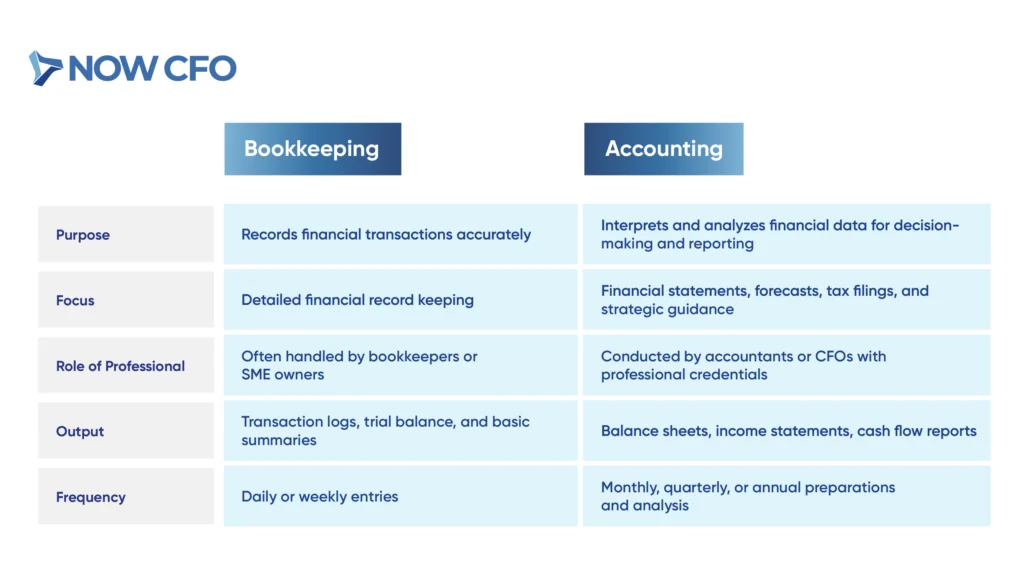
How Bookkeeping and Accounting Work Together
Bookkeeping records every financial transaction, capturing sales, receipts, expenses, and payments. Accountants then analyze that meticulously organized data to prepare financial statements, assess profitability, and guide strategic decisions.
Both bookkeeping and accounting ensure clarity in financial record‑keeping and transform raw data into meaningful insights for growth and compliance. Businesses build a foundation that accountants convert into smarter forecasting, reports, and long-term planning tools.
When to Use Bookkeeping vs Accounting Services
Use bookkeeping basics daily to record transactions and maintain financial record‑keeping when your business is small or in the startup phase. As complexity grows, you’ll require strategic tax planning or audit-ready statements. Engage an accountant or outsourced service to interpret data, ensure tax compliance and reporting, and guide scaling.
Which Does Your Business Need?
If your company handles simple, routine transactions, bookkeeping may be all you need to maintain accurate financial records and stay organized. However, tax planning, forecasting, and transitioning to accounting services become necessary as your business grows.
Bookkeeping ensures that your daily financial activities are properly logged, while accounting provides deeper analysis and strategic guidance. Choosing the right service depends on your business stage, ensuring you understand bookkeeping and when to incorporate.
Types of Bookkeeping Systems
Businesses rely on two primary systems to record, track, and organize their financial transactions effectively.
Single-Entry Bookkeeping
Single‑entry bookkeeping records each financial transaction only once, usually in a cash book, much like tracking personal checkbook activities. It captures only income and expenses, without detailing assets, liabilities, or equity.
This simplicity supports financial record‑keeping and avoids complexity, but it lacks the detail needed for robust financial insights, tax compliance, or performance tracking. Still, it provides a simple way for startups to support financial management.
Double-Entry Bookkeeping
Double-entry bookkeeping records each financial transaction in two accounts: a debit and a credit. Ensuring the fundamental equation (Assets = Liabilities + Equity) stays balanced.
This bookkeeping method actively prevents errors and fraud, offering clarity and accuracy in bookkeeping for SMEs and financial record‑keeping alike. Its dual-entry structure makes it the standard system accounting professionals use across industries.
Unlike the simpler system, double‑entry has complex needs such as tracking inventory, managing payables and receivables, and preparing audit-ready statements. It becomes vital when businesses plan to scale, attract investors, or ensure tax compliance.
Essential Bookkeeping Tasks
Keeping accurate financial records requires consistency, organization, and attention to detail. Essential bookkeeping tasks form the structure that ensures a business operates smoothly and remains financially transparent.
Recording Daily Transactions
Recording daily transactions means logging all sales, purchases, payments, and receipts as they occur, providing real-time insight into your financial position. Moreover, expenses should be recorded when they occur, and it’s best to record transactions daily.
Daily updates to your books ensure accurate cash flow management, minimize missed entries, and support timely tax compliance and reporting. For growing businesses, daily transaction tracking reduces errors and supports swift decision-making.
Reconciling Bank Statements
Reconciling bank statements monthly verifies that your internal books align with the bank’s records. This report is essential for maintaining financial record‑keeping accuracy, detecting unauthorized transactions, and supporting tax compliance and reporting.
Managing Accounts Payable and Receivable
Managing AP/AR directly impacts cash flow and business stability.
- Monitor bills to ensure accurate payments are made on time.
- Maintain consistent payment cycles to avoid late fees.
- Issue and log invoices promptly to ensure revenue is captured correctly.
- Send reminders for overdue accounts to maintain steady inflows.
- Regularly compare payables and receivables to forecast cash needs and avoid shortages.
Tracking Expenses and Income
It’s essential to see how tracking expenses and income provides the foundation for profitability analysis and smarter financial planning.
- Keep detailed records of expenses and income, like supplies, sales, and services.
- Tracking forms the basis for the income statement, revealing net profit and helping you make strategic decisions.
- Organized expense monitoring helps identify inefficiencies, control costs, and improve budgeting and future planning.
Preparing Financial Statements
Preparing statements that turn raw transaction data into clear insights for decision-making and planning is vital in financial management.
- Compile assets, liabilities, and equity into a snapshot of financial standing.
- Translate tracked expenses and income into profit/loss over a period.
- Record the inflows and outflows, ensuring liquidity transparency and reinforcing bookkeeping basics.
Financial statements help to inform investors, lenders, and management, demonstrating the business value of accurate bookkeeping.
Bookkeeping Best Practices for Business Owners
Successful financial management depends on consistency, organization, and the adoption of reliable methods. Following bookkeeping best practices ensures that records remain accurate, processes stay efficient, and decision-making is based on trustworthy data.
Stay Organized with a Bookkeeping Schedule
Creating and following a consistent bookkeeping schedule ensures that every financial transaction receives timely attention, including sales, expenses, and invoice payments. A weekly or monthly bookkeeping routine helps you avoid backlogs and reduce entry errors.
You keep records accurate and current by setting a consistent schedule, like logging daily receipts each evening and reconciling bank statements weekly. This routine strengthens your ability to track performance and make informed financial decisions.
Use Reliable Bookkeeping Software
Adopting reliable bookkeeping software is essential for accurate financial record‑keeping. Unlike manual methods, digital platforms reduce errors, automate reconciliations, and ensure consistent bookkeeping.
In fact, 66% of SME owners use financial accounting software, which improves accuracy and simplifies processes. These systems support streamlined tax compliance and reporting by maintaining organized, audit-ready records.
Regularly Review Financial Statements
Establish a routine, preferably monthly, to review your income statement, balance sheet, and cash flow statement.
- Comparing income statements monthly helps you identify revenue fluctuations and control costs early.
- A consistent review of the balance sheet and cash flow shows whether you can meet liabilities and fund growth.
- Reviewing reports helps owners monitor progress and make timely adjustments, reducing risks of financial missteps.
Separate Personal and Business Finances
One of the most critical steps in maintaining clear and accurate financial records is drawing a firm line between personal and business money.
- Open dedicated business bank and credit accounts. Using separate accounts makes recordkeeping, tax compliance, and reporting easier.
- Keep personal and business spending distinct to ensure only legitimate business costs appear in your ledgers.
- Avoid mingling funds to uphold the limited liability of your business structure and preserve legal safeguards.
- Separate finances reduce confusion when preparing statements and backing up performance insights.
Back Up Financial Data Regularly
Backing up your financial data protects your business against unexpected losses from system crashes, theft, or cyberattacks. Storing copies in secure cloud platforms or external drives provides a safety net, allowing you to recover critical records quickly.
Regular backups safeguard historical data and help maintain compliance and business continuity. Creating a routine backup schedule reduces risks and gives your company a reliable foundation for future reporting and decision-making.
How to Choose the Right Bookkeeping Solution
Selecting the right bookkeeping solution depends on your business size, complexity, and long-term goals. SME may benefit from simple software that automates invoicing and expense tracking, while growing companies often need more robust platforms.
In-House vs Outsourced Bookkeeping
Deciding between in-house and outsourced bookkeeping involves balancing control, cost, and access to expertise.
| Features | In-House Bookkeeping | Outsourced Bookkeeping |
| Control & Oversight | Full control and direct oversight | Less direct control, but provides professional oversight |
| Cost & Resource Use | High overhead salaries, training, and software | More cost-effective, freeing resources for other strategic uses |
| Expertise & Skill Access | Lacks advanced knowledge in tax compliance | Access to a team of experts, helping maintain basic bookkeeping and regulatory knowledge |
| Flexibilities & Scalability | Less flexible, harder to scale with seasonal or growth-based needs | Easier to scale, ideal for fluctuating needs or growth-oriented businesses |
| Technology & automation | Requires internal investment in software upgrades and ongoing maintenance | Includes modern cloud tools and automated systems as part of the service |
Top Bookkeeping Software Options
Choosing the right bookkeeping software can make managing your finances more efficient and less time-consuming. The best platforms offer features like automated expense tracking, invoicing, and reporting, helping you stay on top of cash flow and compliance.
Below are some of the most popular bookkeeping software options businesses rely on today.
- QuickBooks Online
- Xero
- Sage Business Cloud Accounting
- Wave
- GnuCash
Factors to Consider When Choosing a Bookkeeping Service
When evaluating bookkeeping services, remember these key factors to find a provider that truly fits your business needs.
- Confirm the bookkeeper holds relevant certifications and insurance.
- Seek experience in your sector to ensure the bookkeeping service understands your context and financial workflows.
- Ensure the service supports systems you already use, such as payroll and POS software, to streamline daily workflows.
- Choose a provider with strong reviews and dependable communication.
- Pick a service that adjusts capacity as your business grows
Cost of Bookkeeping Solutions
Bookkeeping costs vary significantly depending on approach and complexity. Outsourced solutions typically cost small businesses around $400 monthly. Outsourcing also offers specialized expertise, scalability, and lower fixed costs.
Hiring a part-time in-house bookkeeper averages $21–23 per hour, which can scale to $3,000–$6,000 monthly. When combined with benefits and workspace overhead, in-house sources can cost significantly more.
Scalability for Growing Businesses
As a business grows, financial tasks become more complex and time-consuming. Scalable bookkeeping solutions provide the flexibility to adapt to these changing needs.
Businesses can maintain accuracy and compliance with the right systems or professional support. They can also gain the insights to make confident decisions and sustain growth.
Common Bookkeeping Mistakes to Avoid
Even with the best systems and practices, businesses can encounter pitfalls.
Mixing Personal and Business Finances
Mixing personal and business finances blurs the line between personal and professional spending. This common bookkeeping mistake complicates financial record‑keeping and increases the risk of tax misclassification and scrutiny.
Poor separation of personal and business finances is central to undermining control and clarity. Combining funds can raise audit flags, so it’s recommended that separate accounts be maintained.
Neglecting to Reconcile Accounts
Failing to reconcile accounts regularly leaves financial records misaligned with reality and opens the door to errors, cash flow problems, and undetected fraud. Neglecting this step can lead to inaccurate financial reporting, tax issues, and disrupted operations.
Meanwhile, cash flow problems remain the top cause of SME failure. These risks highlight the need for consistent bookkeeping reconciliations to preserve accuracy in financial record‑keeping and avoid crippling disruptions.
Failing to Back Up Financial Data
Protecting financial data is just as important as tracking it. The following points highlight what can happen when backup practices fall short.
- Losing financial data can disrupt daily operations and create major setbacks.
- Without backups, essential records may be gone permanently.
- Not all backup attempts work as expected, leaving gaps in data protection.
- Failed recovery efforts can delay reporting and decision-making.
- Inconsistent backups can weaken financial accuracy and compliance.
- Over time, these gaps may harm business performance and stability.
Ignoring Small Transactions
To fully embrace what is bookkeeping, business owners must understand why ignoring small transactions is a costly mistake.
- Small expenses left unrecorded add up and distort the accurate financial picture.
- Untracked costs make it harder to control spending and stick to planned budgets.
- Missing transactions reduce visibility of net income and profitability.
- Skipping small amounts may lead to errors when filing deductions or reconciling accounts.
- Inaccurate data limits the ability to make sound, informed business choices.
Overlooking Tax Deadlines
Businesses face serious consequences when they miss important tax deadlines, whether for quarterly or annual filings. Late submissions can quickly create compliance issues, disrupt cash flow, and strain financial stability unnecessarily. Staying on top of reporting schedules is essential to avoid setbacks and keep operations running smoothly.
How Can Outsourced CFOs Help with Bookkeeping?
Building on best practices and systems, businesses ready to scale and sharpen their bookkeeping basics can use outsourced CFOs.
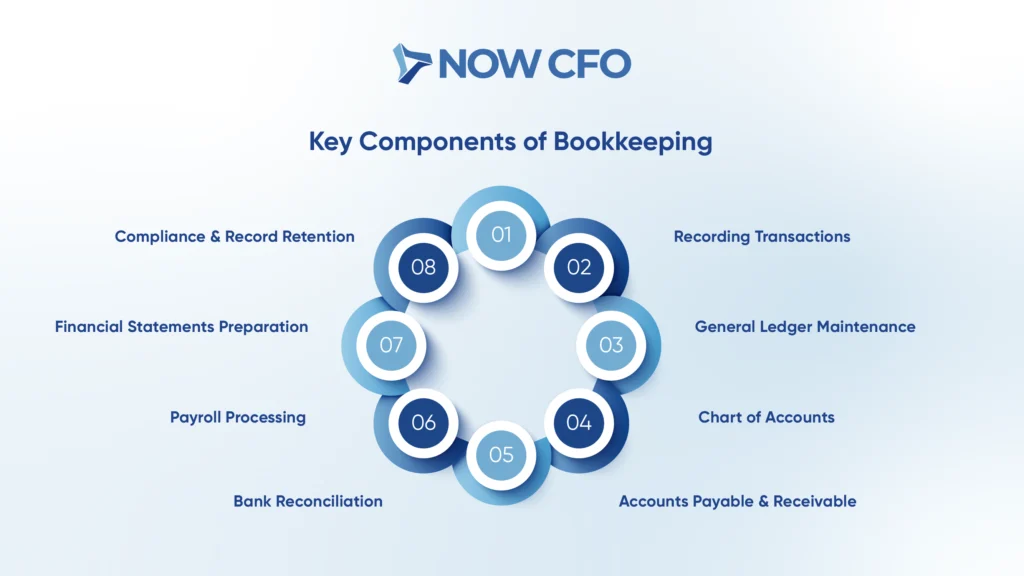
Expertise in Financial Record-Keeping
Outsourced CFOs bring expertise to financial record‑keeping, ensuring every ledger entry aligns with your financial statements and regulatory standards. Because they routinely manage complex financial systems.
CFOs help maintain bookkeeping basics with elevated accuracy and compliance. Additionally, outsourced CFOs use advanced tools and controls to reduce errors and streamline documentation, boosting clarity in your bookkeeping process.
Streamlining Bookkeeping Processes
Outsourced CFOs add value by streamlining processes, turning routine bookkeeping into a faster, more reliable system.
- Outsourced CFOs assess and reorganize your bookkeeping flow, consolidating duplicate steps and automating repetitive tasks.
- To reduce manual effort, CFOs introduce tech like cloud-based ledgers, auto-reconciliation, and dashboard reporting.
- By linking bookkeeping systems with payroll, invoicing, and POS platforms, CFO create a unified ecosystem that reduces errors.
- As transaction volumes grow, your streamlined bookkeeping adapts, ensuring accuracy and consistency with less manual oversight.
Implementing Advanced Bookkeeping Software
Advanced software has transformed how businesses manage their finances by offering real-time visibility, automation, and improved accuracy. Cloud-based platforms are now widely adopted, allowing companies to move away from manual processes.
These cloud-based platforms centralize ledger maintenance, reconciliation, and financial reporting into automated workflows. This integration strengthens bookkeeping basics and enhances long-term financial record-keeping.
Ensuring Compliance with Financial Regulations
Outsourced CFOs help embed compliance into your bookkeeping by aligning recording practices with evolving legal frameworks and reporting standards. Effective compliance reduces financial and legal risks as SMEs face significant regulatory burdens.
By overseeing accurate tax calculations, timely filings, and standards like GAAP, outsourced CFOs ensure your bookkeeping reflects legal standards. CFOs reinforce bookkeeping as a reliable and compliant financial foundation, not just a ledger.
Providing Strategic Insights from Bookkeeping Data
Beyond organizing numbers, outsourced CFOs transform financial data into insights that guide smarter strategies and support long-term business growth.=
- Analyzing revenue and expense trends reveals which products, services, or clients yield the highest margins.
- Using data patterns, outsourced CFOs help anticipate shortfalls or surpluses.
- CFOs compare current data against historical performance or industry standards to highlight strengths and improvement areas.
- Insights from bookkeeping data guide decisions on expansion, staffing, technology investments, or entering new markets.
Reducing Costs Through Efficient Bookkeeping Practices
Efficient bookkeeping practices help businesses cut unnecessary expenses by improving accuracy and reducing errors that often lead to costly corrections. By keeping financial records up to date, companies avoid late fees, missed payments, and duplicate charges.
Outsourced CFOs enhance this efficiency by standardizing workflows, introducing automation tools, and ensuring consistency across all financial activities. With streamlined bookkeeping, businesses can lower administrative costs and gain visibility into spending.
Scaling Bookkeeping Operations for Growing Businesses
Scaling bookkeeping operations means expanding systems, people, and processes as your business scales. This involves implementing workflows, automations, and tools capable of handling increased transaction volume, diverse revenue streams, and multiple entities.
Outsourced CFOs play a pivotal role by designing scalable bookkeeping frameworks, implementing advanced finance systems, and advising on delegation versus automation. They ensure consistent bookkeeping even as transaction load or audit requirements grow.
Conclusion
Mastering what is bookkeeping isn’t just about balancing ledgers; it’s about empowering your business with accuracy, clarity, and strategy. Integrating structured bookkeeping systems, using reliable software, avoiding mistakes, and engaging outsourced support protects your financial health and unlocks growth opportunities.
If you’re ready to elevate your financial management, why not book a free session with our experts at NOW CFO? We can assess your current processes and recommend strategies aligned with your business goals.
Frequently Asked Questions
How Does Bookkeeping Help Me Make Smarter Business Decisions?
Bookkeeping provides clear financial records that reveal where money is earned and spent, helping you plan budgets, control costs, and grow strategically.
Can I Handle Bookkeeping Alone, or Do I Need Professional Help?
Many small business owners start independently, but outsourcing or hiring support ensures accuracy and saves time as transactions grow more complex.
What Tools Make Bookkeeping Easier for Small Businesses?
Cloud-based bookkeeping software simplifies tasks like invoicing, reconciliation, and financial reporting, while reducing the risk of errors common in manual tracking.
How Often Should I Update My Financial Records?
Transactions should be recorded daily or weekly to avoid backlogs. Regular updates prevent errors and keep your financial picture up to date.
What Happens if Bookkeeping is Neglected?
Poor bookkeeping can lead to cash flow problems, tax penalties, and missed growth opportunities. Staying consistent safeguards compliance and supports financial stability.
The basics of business bookkeeping aren’t just about balancing ledgers; they’re about gaining clarity, control, and confidence in finances. Yet many SME owners feel uncertain in this area, 60% feel not knowledgeable about accounting, and 21% admit they don’t know.
Strong bookkeeping practices provide more than compliance. They track daily transactions, reconcile accounts, and prepare reliable financial statements.
What is Bookkeeping?
Bookkeeping is the backbone of financial clarity; it represents the daily essence of the bookkeeping tasks.
Definition of Bookkeeping
At its core, bookkeeping is the systematic process of recording, organizing, and maintaining financial transactions. It ensures businesses accurately capture every sale, expense, payment, or receipt.
Unlike accounting, which analyzes and interprets information, bookkeeping is the foundational layer. Historically done by hand in journals or ledgers, it is now often executed using reliable bookkeeping software for accuracy and efficiency.
Bookkeeping gives startup and SME owners the insights they need to manage cash flow. This report allows owners to maintain financial record-keeping and prepare for tax preparation.
The Role of a Bookkeeper
A bookkeeper actively supports the financial record-keeping by managing the following key tasks:
- Recording daily transactions accurately.
- Organizing documents like invoices, receipts, and deposit slips.
- Reconciling accounts by comparing financial statements against bank records.
- Maintaining books using software to streamline bookkeeping for SMEs.
- Helping business owners meet tax timelines efficiently.
Key Components of Bookkeeping
An effective bookkeeping system centers on these critical components:
- An organized listing of assets, liabilities, equity, income, and expenses.
- Record transactions chronologically in journals, then post them into ledgers.
- Regularly compare your books against bank statements
- Prepare income statements, balance sheets, and cash flow statements.
Bookkeeping in Modern Business
Bookkeeping in modern business integrates digital tools to support financial record-keeping. It helps companies, particularly SMEs, to maintain financial record‑keeping accurately and efficiently.
Why Bookkeeping is Essential for Financial Management
Systematic financial record‑keeping enables business owners to track income, expenses, and trends. Bookkeeping also helps detect cash shortages early, avoiding cash flow problems.
Moreover, documenting transactions and retaining supporting receipts ensures businesses remain tax-ready and compliant. With real-time insights from organized bookkeeping, owners can easily budget, forecast, and set financial goals.
Why is Bookkeeping Important for Businesses?
Bookkeeping enables financial clarity and decision‑making, delivering the information needed to guide growth, optimize performance, and sustain success.
Financial Clarity and Decision-Making
Financial record-keeping empowers business owners to make complex choices with confidence and precision. By applying the bookkeeping best practice, entrepreneurs gain the visibility needed to evaluate performance, adjust strategies, and stay agile.
Through disciplined bookkeeping, small businesses unlock clear visibility into profit margins, cost centers, and revenue streams. Moreover, bookkeeping equips owners to compare actual performance against budgets, identify trends, and make timely decisions.
Tax Compliance and Reporting
It’s vital to ensure businesses meet legal obligations and avoid costly penalties. Through consistent record-keeping and organized documentation, owners align seamlessly with regulatory requirements.
Moreover, accurate bookkeeping simplifies tax filing by consolidating receipts, invoices, and transaction records. It reduces errors, helps business owners avoid risk, stay compliant, and focus on growth.
Tracking Business Performance
Bookkeeping enables owners to measure their progress, monitor trends, and assess the financial health of their business.
- Tracks income streams by product, service, or customer segment.
- Reveals fixed, variable, or recurring cost patterns.
- Owners can quickly identify gaps and adjust strategies.
- Helps determine gross and net profit over time.
- Uncovers fluctuations in cash inflow and outflow.
- Business owners use financial data to plan expansions, hire staff, or adjust pricing.
Improving Cash Flow Management
Effective bookkeeping directly enhances cash flow management. By monitoring daily income and expense patterns, businesses maintain adequate liquidity.
Accurate financial record‑keeping helps identify receivables delays or unexpected outflows. Through organized tracking, owners synchronize invoicing, bill payments, and collections.
Moreover, detailed cash flow data enables forecasting, helping owners plan for expansion or investment. Clear visibility into cash health strengthens credibility with suppliers or lenders, improving terms or securing funding when needed
Learn More: Cashflow management with an outsourced CFO
Ensuring Financial Accountability
Precise financial record‑keeping helps business owners demonstrate reliability.
- Every entry is backed by source documents, ensuring every receipt or expense is traceable.
- Investors, lenders, and auditors rely on clean books to evaluate performance and gauge financial health.
- Well-organized records reduce delays or penalties during audits.
Bookkeeping vs Accounting: What’s the Difference?
Understanding bookkeeping and accounting is essential, as each plays a unique role in maintaining accurate records and guiding smarter financial decisions.
Key Differences Between Bookkeeping and Accounting
While both functions are closely connected, the key differences between bookkeeping and accounting lie in their focus, scope, and contribution to business strategy.
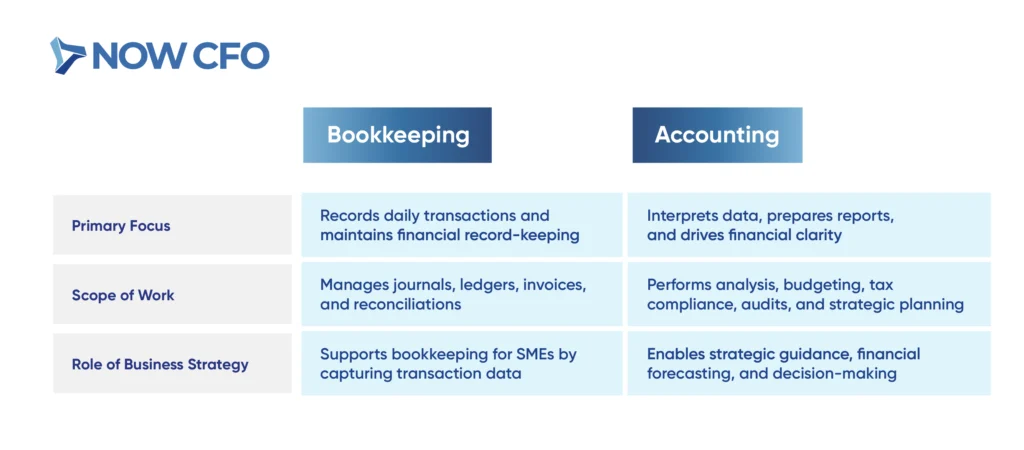
How Bookkeeping and Accounting Work Together
The basics of business bookkeeping and accounting interlock to form a robust financial framework. Bookkeeping lays the groundwork by systematically capturing daily transactions and maintaining financial record‑keeping.
Once accurate records exist, accountants interpret data, analyze it, and prepare strategic reports. Eventually, they turn raw numbers into actionable budgeting, forecasting, and performance tracking insights.
When to Use Bookkeeping vs Accounting Services
Deciding when to use bookkeeping and accounting depends on your business’s size, complexity, and financial goals.
| Scenario | Use Bookkeeping | Use Accounting |
| Transaction Volume & Revenue | Businesses process fewer transactions monthly | When business complexity grows |
| Growth Stage & Complexity | To handle recording, invoicing, and reconciling | To deliver analysis, compliance navigation, and advisory services |
Which Does Your Business Need?
A bookkeeper fits your needs if your business handles daily transactions, invoicing, reconciliations, and basic financial record‑keeping. They keep your books orderly and your data accurate at a manageable cost.
You’ll benefit from an accountant when your business reaches higher operational complexity, demanding forecasting, tax compliance, performance analysis, or planning. Accountant steps in to interpret data, align tax strategy, and guide growth decisions.
Types of Bookkeeping Systems
Not all bookkeeping is managed the same way; different systems offer varying levels of detail, control, and scalability. The right approach depends on your business size, complexity, and growth goals.
Single-Entry Bookkeeping
Under a single-entry bookkeeping system, you record only one side of each transaction, typically income or expense. This record is maintained in a daily cash receipt summary and monthly summaries of cash inflows and outflows.
A single-entry bookkeeping system is the simplest to maintain and can be practical for entrepreneurs launching a small venture. However, it lacks built‑in checks for errors and is less reliable when financial control and accuracy become vital.
Double-Entry Bookkeeping
Double‑entry bookkeeping ensures every financial transaction impacts at least two accounts, typically one debit and one credit. This record maintains both balance and accuracy.
Moreover, it provides a complete picture of your finances by capturing changes in assets, liabilities, equity, income, and expenses. Simultaneously, it reinforces strong financial record‑keeping and supports strategic cash flow management and tax preparation.
Manual vs Digital Bookkeeping
Manual and digital bookkeeping show the difference between old-fashioned record-keeping by hand and modern software.
| Manual Bookkeeping | Digital Bookkeeping |
| Relies on handwritten ledgers | Uses software and cloud tools |
| Prone to human error, time-consuming reconciliations, and a limited audit trail | Automates calculations, reduces mistakes, and ensures cleaner financial record-keeping |
| Basic tracking and offers minimal insights or forecasting capacity for cash flow management | Generates real-time insights, supports forecasting, budgeting, and enhances strategic clarity |
Cloud-Based Bookkeeping Systems
Cloud‑based bookkeeping fully integrates the bookkeeping into a remote, data-driven environment. These systems enable secure, anytime access to financial record‑keeping, improving speed and accuracy across operations.
Cloud systems allow real-time collaboration, automatic updates, and streamlined tax preparation. These platforms often include automated invoicing, reconciliation, and reporting, supporting better cash flow management.
Essential Bookkeeping Tasks
Recording transactions each day can be seen as routine. But it’s the cornerstone of effective financial record‑keeping and maintains consistency across your books.
Recording Daily Transactions
Recording daily transactions captures the business’s day-to-day cash inflows and outflows. It’s best to record transactions daily, whether you’re recording expenses when they occur or identifying sources of income promptly.
By entering every sale, payment, receipt, and purchase as they happen, you prevent data gaps and maintain a reliable ledger. This practice supports tax preparation by ensuring that every deductible expense and every source of income is documented.
Reconciling Bank Statements
Reconciling bank statements ensures that your business records align with actual bank balances. Without this step, errors like unnoticed bank fees, deposits in transit, or uncleared checks can slip through and distort your financial records.
Regular reconciliation strengthens cash flow management by catching differences before they become bigger issues. It also streamlines tax preparation by creating a clear and reliable audit trail.
Managing Accounts Payable and Receivable
Efficiently managing AP/AR ensures that your financial cycle remains healthy and operational.
To manage AP/AR efficiently:
- Schedule vendor payments strategically to maintain strong supplier relationships and avoid late fees.
- Issue invoices promptly, follow up on overdue payments, and maintain clean financial record‑keeping.
- Monitor outstanding receivables and apply collection strategies.
- Adopt digital tools to streamline payables and receivables, reducing manual transactions and lag time.
- Track payables and receivables on time to inform cash flow forecasting, allowing you to plan purchases, investments, and growth.
Tracking Expenses and Income
Tracking expenses and income delivers actionable insights and ensures robust financial record-keeping. When you consistently record money spent and earned, you understand profitability, control costs, and support strategic decision-making.
Accurate tracking allows you to categorize expenses and monitor income from sales or services. Recording income and expenses promptly ensures cash flow management stays proactive.
Preparing Financial Statements
Financial statements transform bookkeeping into actionable business intelligence. It uses your financial record‑keeping to deliver clear snapshots of viability, performance, and opportunity.
- Creates Critical Reports: You produce the income, balance, and cash flow statements. Well‑organized records help small businesses to gain a deeper understanding of business progress and profitability.
- Loan and Investment: Lenders, investors, and potential partners depend on formal financial statements. A balance sheet helps track assets, liabilities, and equity.
- Enables Financial Analysis: With detailed statements, businesses compare performance period-to-period, flag trends, and spot anomalies.
- Strengthens Tax Preparation: Financial statements streamline tax preparation by summarizing income and deductible expenses, simplifying filings, and reducing audit exposure.
- Establishes Accountability and Strategy: You maintain accountability to stakeholders and sustain operational transparency.
Bookkeeping Best Practices for Business Owners
You create systems that keep your books accurate and reliable by staying organized and protecting your records.
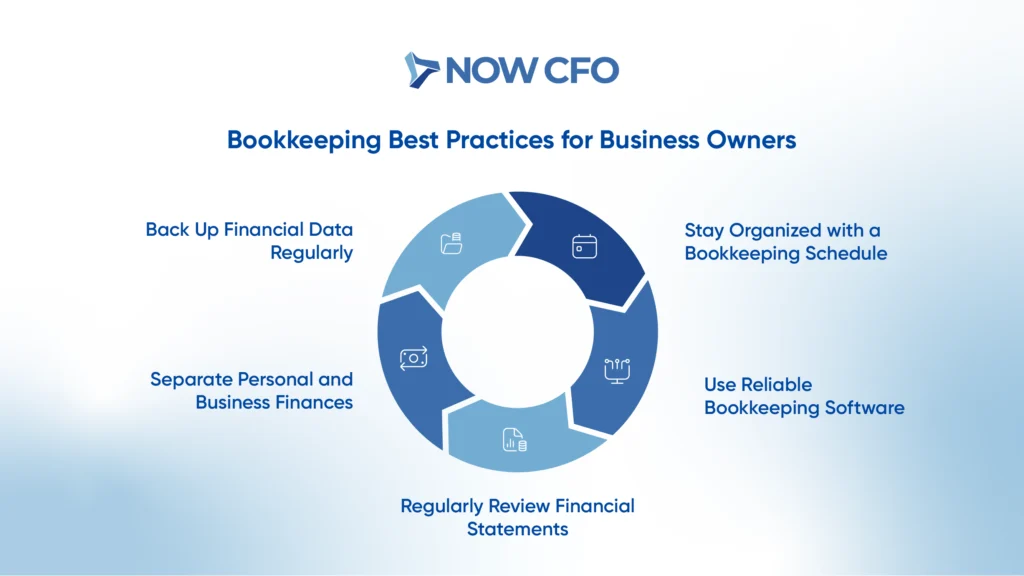
Stay Organized with a Bookkeeping Schedule
Staying organized with a bookkeeping schedule ensures that financial record‑keeping stays accurate, timely, and meaningful. Consistent bookkeeping prevents backlog, reduces errors, and upholds best practices.
Daily or weekly bookkeeping routines strengthen cash flow management and improve tax readiness by avoiding overlooked entries or missing receipts. A daily accounting checklist simplifies responsibilities like updating transactions and reconciling accounts, and keeps financial records meticulously maintained.
Use Reliable Bookkeeping Software
Integrating reliable software automates financial record‑keeping, minimizing errors, and reinforcing bookkeeping best practices.
- Software handles data entry, categorization, and reconciliation.
- Automating calculations and report generation ensures cleaner records, strengthens defenses during tax preparation, and supports clear audit trails.
- You’ll better understand cash flow management with dashboards and reports that update instantly.
- Cloud-enabled tools allow access from anywhere.
Regularly Review Financial Statements
Accurate bookkeeping requires ongoing review and analysis. Regularly examining financial statements gives you a clearer picture of strength and potential issues.
- Analyze income statements, balance sheets, and cash flow reports to assess performance.
- Review statements monthly or quarterly to detect revenue dips, rising expenses, or tightening liquidity early.
- Consistent statement reviews build credibility with investors, lenders, or partners.
Separate Personal and Business Finances
Maintaining a clear separation between personal and business finances protects personal assets and ensures clean financial record‑keeping. Mixing expenses or income blurs the line between personal and business transactions, leading to errors, confusion, and compliance risks.
Back Up Financial Data Regularly
Backing up your financial data consistently safeguards accurate financial record‑keeping and protects against data loss from hardware failure, human error, or cyber threats.
Secure, routine backups create a reliable recovery point for business-critical files such as ledgers, receipts, payroll records, and transaction logs. When disaster strikes, thorough backups save you from manually reconstructing records, preserving accuracy and compliance continuity.
How to Choose the Right Bookkeeping Solution
Choosing the right bookkeeping solution is not a one-size-fits-all decision. The best approach depends on your business size, growth stage, industry needs, and long-term goals.
In-House vs Outsourced Bookkeeping
Choosing between in-house and outsourced bookkeeping involves balancing control, cost, and scalability.
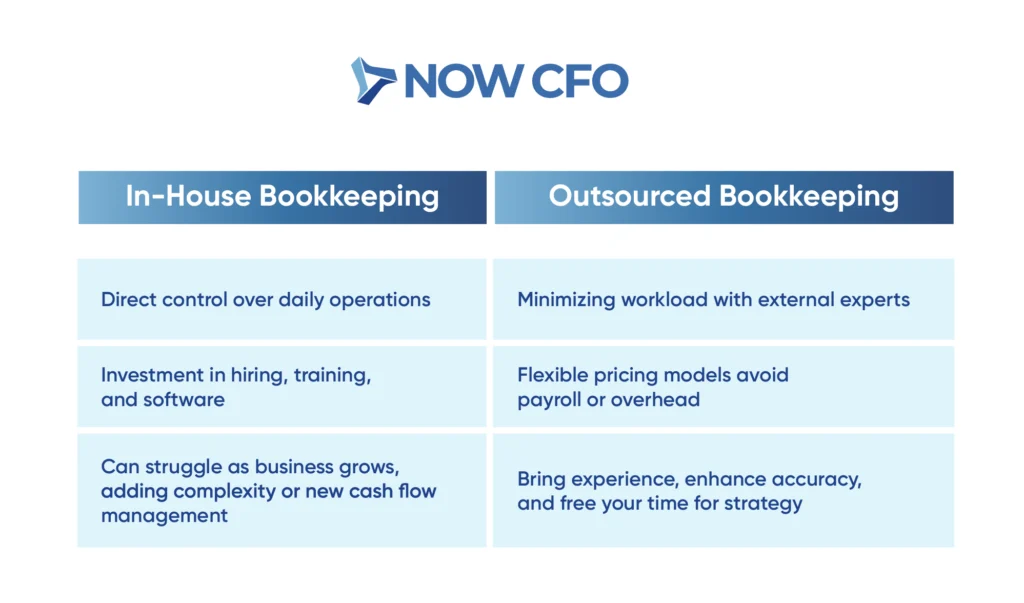
Top Bookkeeping Software Options
You want software that streamlines financial record‑keeping and enhances bookkeeping best practices. Here are proven, widely-recommended options favored by small business owners:
- QuickBooks Online
- Xero
- Zoho Books
- FreshBooks
- Sage Business Cloud Accounting
- Wave Accounting
Factors to Consider When Choosing a Bookkeeping Service
When selecting a bookkeeping service, weighing several key factors is essential.
- Choose a service provider with proven experience in your sector.
- Evaluate whether the provider covers daily transaction processing, reconciliation, financial reporting, and other services.
- Look for a service that uses bookkeeping software that is compatible with your existing systems.
- Avoid service providers with hidden fees and confirm whether billing is monthly, per transaction, or per service bundle.
- Your provider should offer timely responses, regular updates, and accessible support.
Cost of Bookkeeping Solutions
Knowing the cost of bookkeeping solutions will help you plan budgets and achieve long-term financial clarity. Here’s a breakdown of typical cost structures:
- Monthly Packages: Many SMEs pay a flat monthly fee for comprehensive services.
- Percentage of Revenue: Certain providers charge based on revenue; typically 1% to 3%, aligning their compensation with your business success.
- Part-Time or Hourly Rates: Freelance or part-time bookkeepers often charge $21–23 per hour.
- In‑House Bookkeeper Cost: Hiring a full-time bookkeeper involves salary and benefits. The average annual salary of a bookkeeper is approximately $50,000.
Scalability for Growing Businesses
Enforcing accurate bookkeeping requires systems that scale seamlessly while preserving financial record‑keeping accuracy and efficiency as your business expands. Flexible solutions allow you to sustain growth without revising your entire bookkeeping process.
Scalable bookkeeping tools offer unmatched growth support. In the US, over 75% of SMEs have adopted cloud accounting. These platforms handle increasing transactions, multi-user access, and complex workflows.
Common Bookkeeping Mistakes to Avoid
Minor missteps in bookkeeping can have lasting consequences. By recognizing the common mistakes, you can take preventive steps to strengthen your bookkeeping practices.
Mixing Personal and Business Finances
One of the most pervasive and harmful mistakes in bookkeeping is commingling personal and business finances. Doing so compromises financial record‑keeping, inflates tax liabilities, and jeopardizes legal protections.
Besides, many SME owners mix personal and business expenses on their business cards. This seemingly minor action complicates bookkeeping, blurs expense tracking, and hinders accurate tax preparation.
Neglecting to Reconcile Accounts
Neglecting to reconcile accounts poses a serious risk because it weakens your financial record-keeping and can create hidden cash flow problems. When you skip regular reconciliation, you miss discrepancies like unrecorded bank fees, deposits in transit, or unauthorized withdrawals.
By reconciling monthly or weekly, you promote disciplined bookkeeping, prepare accurate statements for tax preparation, and ensure your financial foundation stays trustworthy.
Failing to Back Up Financial Data
Neglecting to back up your financial information puts your business at serious risk. Without reliable backups, even a single disruption can lead to irretrievable data loss, costly downtime, and regulatory headaches.
Nearly 35% of businesses face data losses and can’t recover their data because they lack proper backups. Even minor failures can disrupt your bookkeeping, making data loss highly probable.
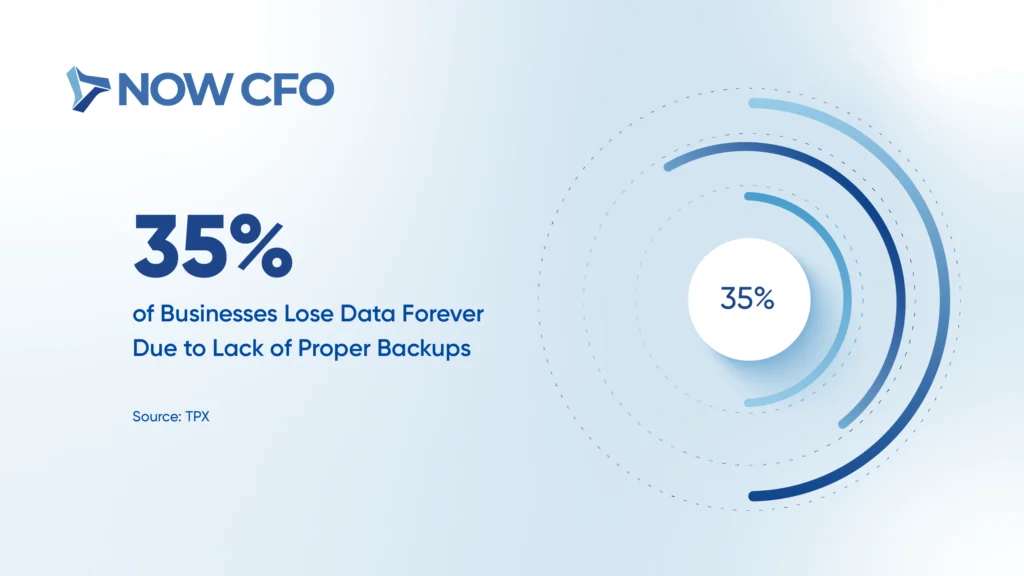
Ignoring Small Transactions
Overlooking small transactions can quietly derail your bookkeeping. While they may seem insignificant, these entries impact your financial record‑keeping accuracy and obscure cash flow visibility.
Ignoring small transactions disrupts the completeness of your records, diminishes data integrity, and undermines bookkeeping best practices. Without tracking minor costs, businesses can miss cumulative expense leaks that negatively affect profitability.
Overlooking Tax Deadlines
Failing to meet tax deadlines threatens the bookkeeping and exposes your business to financial record‑keeping risks.
Here’s why staying on top of deadlines matters:
- Monthly Penalties: Missing a tax filing deadline triggers a 0.5 % penalty on the unpaid tax per month (up to a maximum of 25%).
- Liability Across Tax Types: Quarterly estimated tax payments and employment or sales tax filings also carry penalties and interest if missed.
- Increased Audit Risk & Administrative Burden: Repeated missed deadlines can attract IRS attention, draw scrutiny, and increase compliance burdens.
Conclusion
The basics of business bookkeeping are the backbone for sustainable financial health. When done right, bookkeeping keeps your records accurate, your cash flow steady, and your business prepared for tax obligations. More importantly, it transforms your financial data into a tool for intelligent decisions.
NOW CFO specializes in helping businesses like yours establish strong bookkeeping practices. Take the next step: Reach out for a no-pressure, free consultation and connect with one of our experts. By partnering with experienced professionals, you ensure that your bookkeeping is not just a requirement but a strategy for long-term success.
Frequently Asked Questions
What is the Easiest Way for a Beginner to Start Bookkeeping?
A beginner can start by setting up a simple system to record income and expenses daily, either using spreadsheets or user-friendly bookkeeping software.
How Often Should Small Businesses Update Their Books?
Most small businesses benefit from updating their books weekly, while larger businesses with higher transaction volumes should update them daily.
Do I Need Bookkeeping if I Already Use Accounting Software?
Accounting software helps, but proper bookkeeping is still needed to enter accurate data, reconcile accounts, and generate meaningful reports.
What Happens if I Don’t Keep Accurate Bookkeeping Records?
Inaccurate records can lead to poor financial decisions, missed tax deductions, compliance issues, and potential cash flow problems.
When Should a Business Consider Outsourcing Bookkeeping?
Businesses often outsource when transactions increase, when owners want to focus on growth rather than admin tasks, or when professional accuracy becomes essential.
Startups face an unforgiving market, with over 70% failing within five years, often due to mismanaged finances and a lack of strategic oversight. Given this reality, financial clarity becomes mission-critical.
A recognized trend underlines that startups should consider CFO services early on. CFO services bring structured financial discipline to startups, enabling precise forecasting, scalable accounting, and seamless investor engagement.
Why Financial Leadership Matters for Startups
Strong financial leadership lays the foundation for startup resilience, helping founders manage resources wisely and gain investor confidence.
Common Financial Challenges in the Startup Phase
CFO-led cash-flow forecasting protects companies from liquidity crises and extends their runway. Here are the most urgent obstacles founders encounter:
- Poor cash‑flow forecasting leads to sudden capital shortages.
- Burn‑rate miscalculations erode runway unexpectedly.
- Lack of structured budgets or financial projections.
- Weak internal oversight increases financial risk.
- Overly optimistic revenue assumptions derail growth plans.
Importance of Reliable Financial Statements for Investors
Reliable financial statements prove startup viability and guide investor decisions. Startups should consider CFO services from day one.
Key investor requirements:
- Audited or reviewed statements enhance credibility with potential backers.
- Financial disclosures reduce perceived investment risk.
- Clear revenue and expense reporting supports valuation accuracy.
How Early Financial Planning Prevents Future Setbacks
Detailed early-stage financial planning supports founders in growing with foresight and resilience. Effective early-stage financial planning, guided by seasoned CFOs, transforms reactive operations into a proactive strategy.
Establishing solid budgets and forecasts ahead of milestones helps avoid cash crunches, staffing missteps, or missed revenue targets. CFO involvement in annual operating plans further structures financial trajectories, which will promote informed investments.
Building Credibility with Stakeholders and Lenders
Credible financial leadership builds lasting trust with key stakeholders. Active, structured financial management signals maturity and transparency. CFO services for startups enable disciplined reporting and governance that earn lender confidence.
Precise financial forecasts, backed by startup financial management systems, reduce uncertainty, making lenders more receptive. Strong documentation and clean reporting also ease underwriting.
Why Startups Often Underestimate Financial Oversight
Early-stage entrepreneurs may overlook critical oversight due to inexperience, resource constraints, or overly optimistic forecasts. Careful oversight requires structured accounting, clear authorization protocols, and audit readiness.
Cognitive biases further distort oversight. Overly optimistic founders often underestimate risk and inflate projections, leading to oversight breakdowns. Also, the absence of governance creates moral hazards in resource use, primarily when no institutional checks exist.
Learn More: Outsourced CFO Services
Key Advantages of CFO Services for Early-Stage Companies
Strong financial leadership translates early-stage risks into structured growth, clearly showing why startups should consider CFO services.
Structuring Financial Models for Growth and Scalability
Effective financial models lay the foundation for planned expansion. CFO services enable scalable design that anticipates market shifts, investor expectations, and resource limits.
Moreover, scalable financial models align budgeting, staffing, and capital investment with growth trajectories. Accurate forecasting and financial modeling help maintain runway control while preparing for opportunity-driven expansion.
Budgeting and Annual Operating Plans for Stability
Seamless transition into structured growth requires disciplined budgeting and forecasting. Dynamic budgeting and comprehensive operating plans are the backbone for stability and strategic alignment.
Only about 50% of SMEs survive five years. CFO services establish financial frameworks that anticipate fluctuations and align with; nearly 65% fail by year ten.
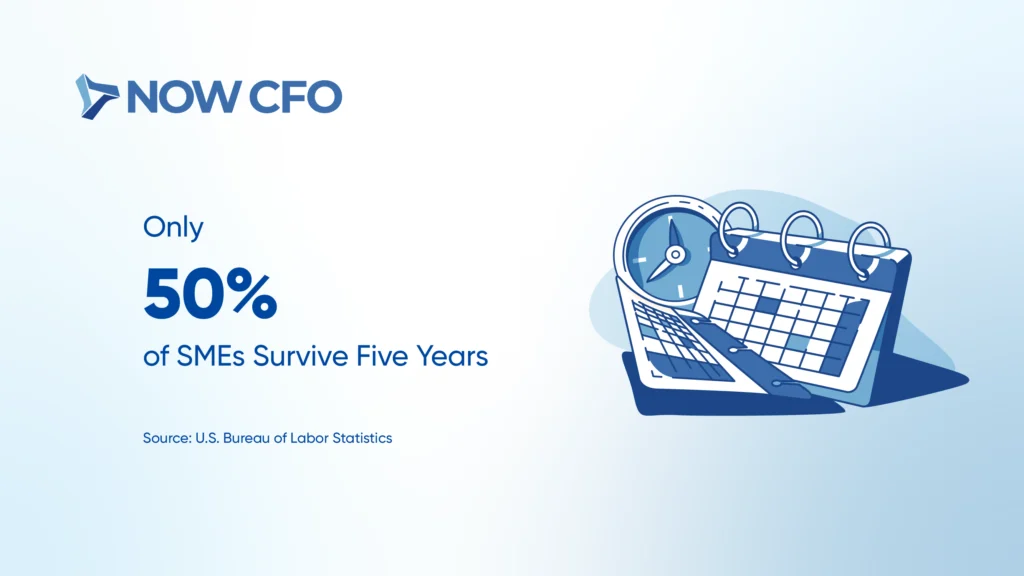
Strengthening Internal Controls From Day One
Strong oversight shields startups from errors, fraud, and inefficiency. Establishing internal controls early promotes accountability, accurate reporting, and reduced risk.
Without firm internal control, funds can be misused or manipulated. Many SMEs underestimate these safeguards, yet adequate internal controls are achievable and essential.
Tax Planning and Audit Readiness for Compliance
Firms that embrace data analytics reports will have higher productivity and profits. Embedding such insights into financial models strengthens the accuracy of spending planning and fundraising narratives.
List of key compliance actions:
- Implement proactive tax planning to optimize deductions and minimize liabilities
- Track deadlines and filings to avoid IRS penalties or interest
- Prepare financial records for potential audits or investor requests
- Establish GAAP-based accounting to simplify tax and audit processes
Using Data-Driven Insights for Better Decisions
Data-driven insights complement strategic moves, demonstrating why startups should consider CFO services early.
- Use trend analysis to anticipate cash‑flow shifts and avoid liquidity traps..
- Monitor expense drivers through real-time dashboards for adaptive control.
- Analyze ROI on marketing to align with scalable budget allocations.
- Evaluate product margin trends to prioritize profitable lines.
- Track burn patterns to make proactive hiring or scaling adjustments.
Learn More: Fractional CFO Services
How CFO Services Help Startups Secure Funding
Securing funding demands clear financial direction and credibility.

Preparing Financial Forecasts for Investor Presentations
Thoughtful financial forecasting helps startups justify capital needs, strengthen credibility, and align with investor expectations. An outsourced CFO for startups leverages detailed analytics to create forecasts tied to strategy and milestones.
Navigating the Capital Raise Strategy Effectively
Capital raise strategy shapes growth and control, making it critical for founders to align financing with long-term goals. CFO services clarify investor targeting, timing, and funding structures, whether equity, debt, or hybrid.
Startups that lack structured oversight risk choosing misaligned instruments or diluting equity prematurely. CFO guidance ensures capital raises connect directly to annual operating plans, forecasting, and financial modeling.
Aligning Financial Statements with Investor Expectations
Consistent alignment fosters trust and credibility, highlighting the importance of CFO services for startups.
- Present GAAP- or IFRS-compliant statements to match investor analysis standards.
- Reconcile projections consistently with historical performance data.
- Include explicit assumptions and scenario analysis in financial models.
- Use transparent disclosures to reduce investor due diligence friction.
- Tailor metrics (e.g., margins, burn rate) to investor priorities.
Enhancing Valuation with Accurate Reporting
Accurate reporting strengthens a startup’s worth, so startups should consider CFO services from day one.
- Use GAAP‑compliant statements to align with investor standards.
- Reconcile forecasts with results for trust and consistency.
- Highlight margins and burn‑rate transparently.
- Disclose assumptions behind projections clearly.
- Note one‑off items to avoid valuation misinterpretation.
Building Confidence with VCs and Private Equity
Robust financial leadership reassures venture capitalists and private equity firms that due diligence will not uncover misleading data or governance gaps. CFO services establish precision, discipline, and scalability.
Backing from VCs impacts outcomes. When financials align with expectations, founders elevate their positioning from hopeful entrepreneurs to credible partners.
Learn More: The Importance Of Internal Controls
Overcoming Startup Risks with CFO Services
Unchecked cash decline poses existential risks for startups, underscoring the importance of engaging CFO services early to manage liquidity challenges..
Identifying Cash Burn Issues Early
Monitoring burn rate safeguards firm survival. CFO services establish structured cash oversight, preventing overspending and extending the runway.
Many startups remain negative in cash flow due to poor burn management. CFO-led forecasting ties burn analysis into annual operating plans, ensuring expense control, investor confidence, and sustainable financial management.
Establishing Internal Controls to Reduce Fraud
Implementing controls from the start helps startups prevent financial leakage.
- Set segregation of duties to limit unauthorized access and errors.
- Enable surprise audits that deter internal misconduct, reducing fraud losses.
- Launch anonymous reporting mechanisms to surface suspicious activity quickly.
- Leaders should conduct regular management reviews to detect discrepancies early.
- Deploy formal anti‑fraud policies to frame organizational expectations and behavior.
Managing Payroll and Bookkeeping Efficiently
Correct payroll and bookkeeping streamline operations and preserve cash and trust. Operational efficiency depends on timely, accurate payroll and accounting. Manual errors in payroll can result in penalties for late or incorrect filings.
CFOs establish reliable systems that automate tax deposits, reconcile payroll forms, and ensure proper bookkeeping. By centralizing expense tracking and cash flow monitoring, efficient bookkeeping supports accurate forecasting and financial modeling.
Ensuring Compliance with SEC and State Regulations
Meeting regulatory requirements shields startups from costly penalties and reputational damage.
Critical compliance steps:
- File appropriate federal securities exemptions (e.g., Reg D or Reg A+) with audited financials.
- Submit required state Blue Sky disclosures to comply with local securities laws.
- Use secure disclosure portals like the SEC’s EDGAR for accurate, timely filings.
- Track deadlines for periodic reporting to avoid enforcement actions or fines.
Mitigating Risks in Mergers & Acquisitions Preparation
M&A opportunities often carry hidden hazards. So, founders need to recognize the need for CFO services early to mitigate deal-related risks proactively.
CFO-driven M&A readiness ensures structured risk identification and mitigates value loss. Building a strong framework turns potential missteps, like due diligence gaps, cultural misalignment, or overvaluation.
Why Partnering with NOW CFO Makes a Difference
Partnering with NOW CFO provides access to financial expertise tailored to their growth stage without full-time cost. We deliver scalable solutions that adapt as needs evolve, from cash-flow oversight to audit readiness and funding preparation.
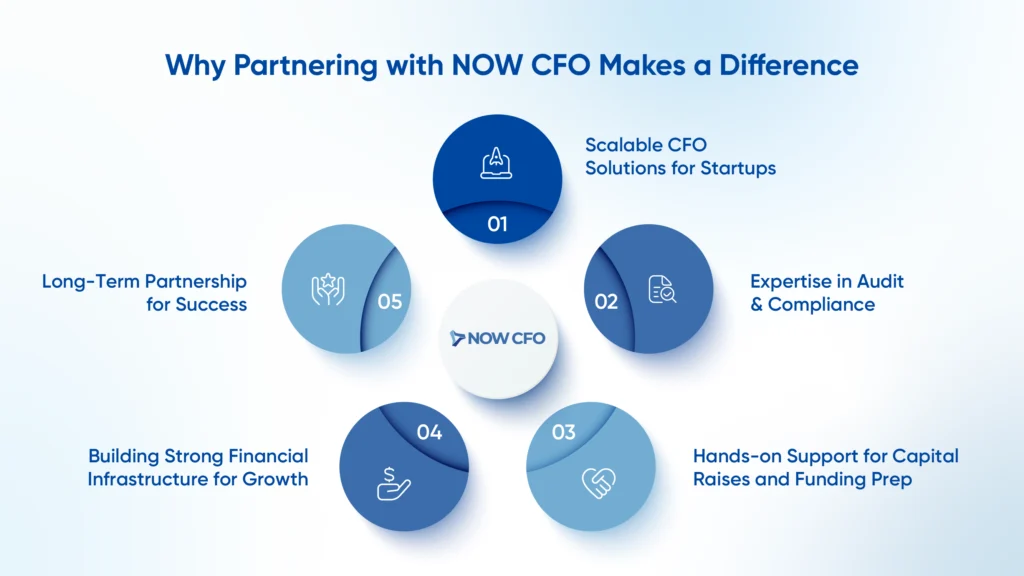
Scalable CFO Solutions Designed for Startups
Our flexible and scalable CFO support keeps pace with startup growth. Key benefits of scalable CFO solutions:
- Scale CFO engagement up or down as needed.
- Gain senior-level expertise without the cost of a full-time hire.
- Access targeted financial modeling at key inflection points.
- Adjust support scope during seasonal or rapid growth phases.
- Add strategic planning only when needed, controlling overhead.
Expertise in Audit Preparation and Compliance Readiness
Early-stage startups often face unexpected audit or compliance reviews before reaching IPO readiness. We help startups prepare for such scenarios.
Full audit preparedness requires organized records, a reliable internal control framework, and knowledge of regulatory expectations. Our CFO services ensure financial statements align with standards, support audits, and compliance.
Hands-on Support for Capital Raises and Funding Prep
Capital raises require precision and timing, so startups benefit from seeking CFO services early. We ensure financial forecasts, valuation models, and investor materials are ready with clarity and accuracy.
Founders also gain stronger narrative coherence and credibility during fundraising. Structured capital readiness supports confident pitch delivery and demonstrates clear, achievable milestones.
Building Strong Financial Infrastructure for Growth
Strong infrastructure empowers scalable and resilient operations. Critical infrastructure components are:
- Establish robust accounting systems to support long-term reporting clarity.
- Adopt the Green Book internal control framework for operational consistency.
- Implement scalable forecasting tools aligned with company growth stages.
- Deploy KPI dashboards that integrate with annual operating plans.
- Formalize approval workflows to enforce control and efficiency.
Long-term Partnership for Sustainable Business Success
CFOs direct long-term value by integrating sustainability into financial strategy. Nearly 69% of CFOs recognize environmental sustainability as essential for growth. Structured finance leadership supports innovation, upholds investor values, and guides startups.
Conclusion: Setting Your Startup on the Right Path with CFO Services
Building a strong business starts with financial leadership that can evolve alongside growth. Startups Should Consider CFO Services early to anchor that journey and gain stability, insight, and agility.
Want to strengthen your startup’s financial strategy? Book a free consultation with NOW CFO to design a financial roadmap built for growth. With scalable financial leadership today, you secure your startup’s future tomorrow.
The rise of outsourced CFO adoption reflects a clear shift in how modern businesses manage financial leadership. This surge comes from persistent talent shortages and escalating cost pressures, compelling organizations to look beyond traditional hiring.
Instead, fractional and outsourced CFO services offer agile, high-level expertise tailored to the needs of growing firms. These models provide access to experienced financial talent that can scale with your business and manage cash flow effectively.
1. Healthcare
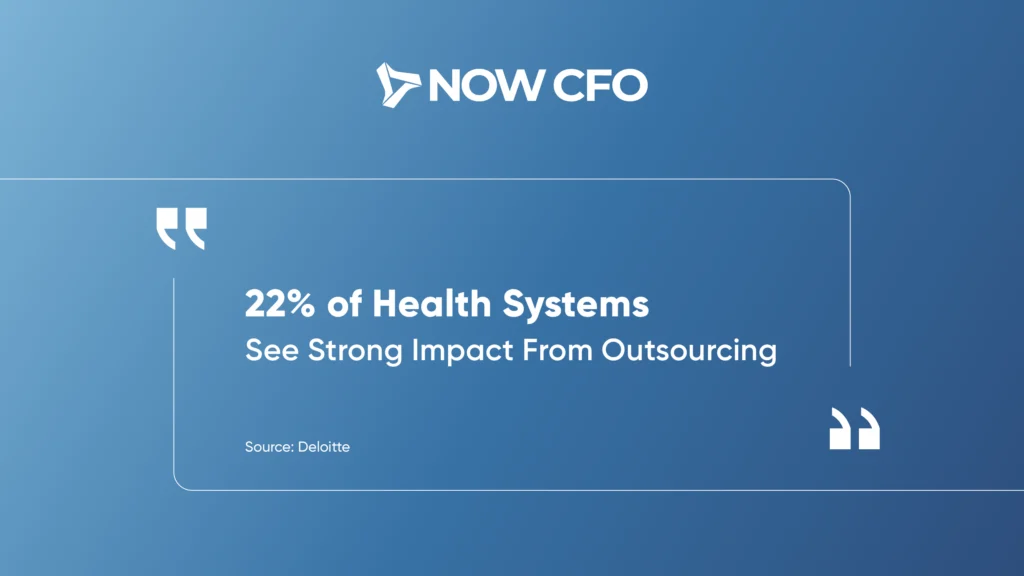
Among healthcare organizations outsourcing non-core finance functions, 22% of health systems and 31% of health plans report a positive impact. These gains reflect the growing role of external financial support in boosting efficiency and managing compliance-heavy environments.
By outsourcing tasks like accounting and financial reporting, healthcare providers can cut costs by up to 28%. Fractional CFOs bring industry expertise to support accurate reporting, audit readiness, and tighter financial controls.
Source: Deloitte
2. Manufacturing
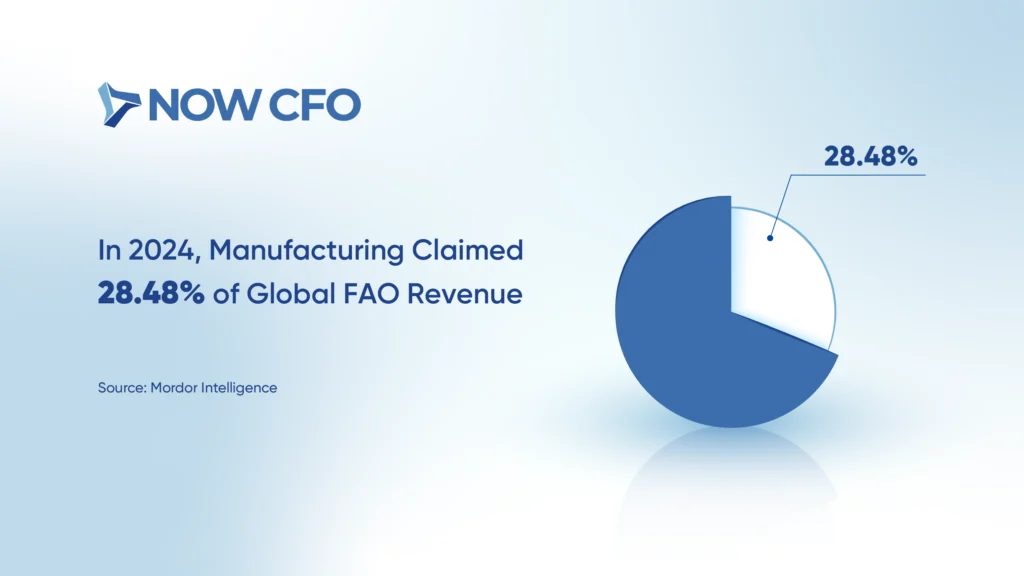
In 2024, manufacturing accounted for 28.48% of global finance and accounting outsourcing revenue, the largest industry share. With the challenges of complex supply chains and rising costs, manufacturers turn to outsourced CFOs to manage margins and improve reporting.
Outsourced CFOs bring sector-specific expertise to help manufacturers adopt leaner financial structures. CFOs optimize job costing and cash flow management to enhance budget accuracy across multiple facilities.
Source: Mordor Intelligence
3. Retail

The retail BPO market, including critical financial functions like order-to-cash and procurement, was valued at $20.3 billion in 2024. It’s projected to grow at a compound annual rate of 13.9% through 2030.
Outsourced CFOs help retail businesses stay competitive by improving cash flow visibility, managing vendor payments, and optimizing inventory financing. Their strategic oversight ensures better financial control in a fast-moving, margin-sensitive environment.
Source: Horizon Grand View Research
4. Finance

90% of finance leaders now outsource at least some accounting functions to manage talent shortages and rising operational costs. This shift reflects a growing recognition that outsourcing offers agility and strength in today’s budget-constrained environment.
Fractional CFOs services are driving this transition by delivering high-level financial strategy while managing day-to-day processes precisely. Businesses reduce overhead and gain access to expert insights that strengthen forecasting, compliance, and cash flow management.
Source: The CFO
Conclusion
As CFO priorities evolve, outsourced CFO adoption offers a compelling model for businesses that need strategic financial leadership. These CFO services are on demand and without the permanent executive cost.
Ready to explore how a fractional CFO could transform your finance operations? Schedule a free consultation at NOW CFO. Build a more innovative, scalable finance strategy without the constraints of a full-time hire.
Frequently Asked Questions
What industries are seeing the fastest growth in outsourced CFO adoption?
Industries such as technology startups, healthcare, retail, and SaaS are leading the way, with increasing demand for manufacturing and professional services. The trend reflects businesses across sectors seeking flexible, cost-effective financial leadership.
Why are traditional industries turning to fractional or outsourced CFOs now?
With tighter margins, regulatory demands, and economic uncertainty, many industries find it more practical to leverage fractional CFOs. Outsourced financial leaders provide immediate expertise without the full-time overhead cost.
Can an outsourced CFO specialize in my specific industry?
Yes. Outsourced CFOs often bring deep sector expertise—from healthcare compliance to SaaS revenue forecasting or retail cash flow management—allowing them to tailor strategies to your industry’s unique challenges.
What are the benefits of a part-time or fractional CFO in regulated sectors like healthcare or nonprofits?
They ensure compliance, improve audit readiness, and bring structure to reporting. This is especially valuable in industries where regulatory oversight and financial transparency are critical.
How do outsourced CFOs support scaling businesses like startups or franchise groups?
Outsourced CFOs build financial growth models, improve cash flow management, and ensure investor relations. For franchises, they also provide consistency across multiple locations.
Companies seeking sustainable growth cannot rely solely on instinct. That’s why knowing how to choose the right CFO services matters more than ever.
Besides, firms with fewer than 20 employees spend more per employee on tax compliance than larger firms. Additionally, a well-chosen CFO service provides strategic insights and future-focused financial planning to support long-term success.
Understanding the Role of CFO Services in Sustainable Growth
To know how to select the right CFO services, it’s crucial to understand what CFO services involve.
Defining CFO Services and Their Scope
When you choose the right CFO services, you engage professionals who deliver various strategic CFO services. This will include financial strategy development, forecasting, budgeting, cash flow, risk management, cost control, and M&A support.
This comprehensive scope empowers you to benefit from sustainable growth with CFO services. An external CFO integrates these functions without the cost of a full-time executive.
How CFO Services Support Business Accounting and Operations
Here’s how choosing the right CFO services enables robust support for your accounting processes and operational efficiencies, aligning financial operations with strategic goals.
- Accurate Record-Keeping: CFO services establish standardized protocols for bookkeeping, reconciliation, and transaction logging.
- Cash Flow Management: They implement tools and processes to monitor inflows and outflows.
- Routine Operational Tasks: Through technology integration, CFOs often introduce automation for recurring operations, like AP, payroll processing, and monthly close.
- Reporting and Compliance: CFO Services creates comprehensive, timely reports for management, investors, and regulators.
- Strengthen Internal Controls: They also assess risk and implement internal checks like division of duties, oversight mechanisms, and authorization workflows.
- Strategic Operational Planning: CFO services bridge daily operations with broader strategic objectives like scaling, expansion, or mergers.
The Link Between CFO Services and Accurate Financial Statements
Next, we examine how choosing the right CFO services directly enhances the precision of your financial statements.
So, the main thing is that with the right CFO, you secure experts who apply precision across your financial records. They also ensure your balance sheets, income statements, and cash flow statements reflect true business performance.
Moreover, these service boosts financial accuracy by managing reconciliations, reviewing journal entries, and validating data. This clarity empowers you with credible insights for sustainable growth with CFO services.
Why Internal Controls Matter for Long-Term Success
Let’s explore how choosing the right CFO services ensures robust internal controls.
You can choose the right CFO services with effective internal controls.
- Protects physical and financial resources from theft or misuse.
- Identify and correct inaccuracies quickly, ensuring financial integrity.
- Support accurate financial statements, helping sustainable growth, and investor trust.
- Ensure following with laws and standards like Sarbanes‑Oxley and GAO frameworks.
- Build confidence for long‑term planning, expansion, and capital‑raise readiness.
The Role of Modeling and Forecasting in Growth Planning
Many business leaders today say that accurate forecasting is essential for strategic decision‑making. So, when you choose CFO services, modeling and forecasting empower growth planning by:
- Estimates income to support budgeting and capital‑raising decisions.
- Model best‑and worst‑case outcomes for informed strategic choices.
- Align investments with areas offering the highest returns for long‑term growth.
- Provide clear, data‑driven forecasts that attract funding.
- Support decisions on scaling, new markets, and M&A readiness.
Key Factors to Consider When Choosing CFO Services
After understanding the role of CFO services, the next step is to assess their industry experience and relevant case studies.
Industry Experience and Relevant Case Studies
It’s important to understand industry variation. Because financial frameworks, compliance norms, and performance indicators vary across sectors. For example:
- In tech startups, CFOs must comply with SaaS revenue recognition standards (ASC 606).
- While manufacturing CFOs manage complex inventory accounting and operational efficiencies.
- Service-based firms focus on labor and overhead efficiency; product businesses optimize supply chain and material costs.
- Seasonal retailers require different cash flow forecasting than subscription-model firms with recurring revenues.
When evaluating CFO services, you need to review examples that demonstrate:
- CFO services that guided a company through annual growth.
- Documented support in preparing a business for successful debt financing.
- Instances where the CFO expert has improved gross margins by implementing cost-control policies.
Knowledge of SEC Compliance and Reporting Requirements
Proper SEC compliance knowledge is vital to maintain credibility and avoid costly penalties. In FY 2023, the SEC filed 784 enforcement actions, an 8% rise from the prior year. The table below shows how CFO services support these critical areas.
| SEC Compliance Area | CFO Services Requirements |
| Forcing Action Awareness | Prevents fines by staying alert to enforcement trends |
| Recordkeeping Requirements | Robust policies meet federal recordkeeping mandates |
| Timely Filing Discipline | When you choose the right CFO services, you support compliance and reduce legal exposure |
| SOZ Readiness | They implement SOX-compliant internal controls and align strict corporate governance standards |
| Cybersecurity Compliance | Integrates the SEC’s cybersecurity disclosure rules |
| Risk Management | Monitor changing rules and coordinate with legal teams. |
Proficiency in Annual Operating Plans and Budget Management
When you look for the right CFO services, you secure experts who:
- Build detailed yearly plans that match your business growth and funding goals.
- Keep your budgeting flexible by updating it regularly instead of once a year.
- Watch expenses closely and compare them to your budget to catch problems early.
- Track performance using clear dashboards that show how you’re doing against budget goals.
- Get ready for investors by showing strong, honest financial plans that match your business goals.
Capability in Bookkeeping and Payroll Services Integration
Always choose the right CFO services, their expertise in integrating bookkeeping and payroll services becomes key for scalable operations. These services connect payroll systems with accounting ledgers, processing transactions consistently and accurately.
It also supports regulatory compliance by maintaining accurate payroll tax records and audit trails. Moreover, by outsourcing this function, businesses often see a reduction in administrative workload.
Support for Audit Preparation and Capital Raise Readiness
There are tons of benefits of CFO services when you make the right choice:
- They enforce systematic recordkeeping that matches auditor requirements.
- CFO services streamline audits by aligning with external auditors on scope, evidence, and execution.
- Uncover gaps in internal control or financial reporting.
- They refine financial statements, forecasts, and notes.
- Integrates capital planning with operations.
Matching CFO Services to Your Business Growth Stage
Now that we’ve covered the major evaluation criteria for CFO services, let’s apply this insight to different phases of your business lifecycle.
Choosing CFO Services for Startups and Early-Stage Companies
82% of startups fail due to poor cash flow management, underscoring the impact of a CFO’s financial oversight.
When you choose the right CFO services for startups and early‑stage companies, you gain financial leadership that:
- Sets clear spending targets while aligning with strategic development goals.
- Introduces simple but effective controls to safeguard assets.
- Creates clean, credible statements and forecasts for pitches.
- Delivers CFO-level insight without the cost of hiring full-time leadership.
Selecting CFO Support for Scaling Businesses
You need to choose the right CFO services for scaling businesses to ensure you gain financial guidance that:
- Strengthens financial infrastructure.
- Implements scalable reporting.
- Enhances Cash Flow management.
- Facilitates cost scalability.
- Prepares for series A/B rounds.
- Integrates with ERP systems.
Aligning CFO Services with Mergers & Acquisitions Strategies
With the right choice, you’ll get sustainable growth with CFO services. These experts shape acquisitions by evaluating value, modeling synergies, and forecasting outcomes. They also manage the due diligence process thoroughly.
Critically, these services avoid deal risks by validating pricing assumptions and avoiding overvaluation. All the while, they also develop accurate post-merger forecasts. Also, they work to capture the intended value of the deal.
Adapting CFO Support for Established Enterprises
As businesses mature, their financial demands become more complex. Therefore, you’ll require CFO services that can scale systems, improve visibility, and support enterprise-level strategy.
- Optimize cost centers to reduce waste and manage spending.
- Integrate ERP and BI tools for complete financial visibility.
- Produce financial reports for boards and executive leadership.
- Guide multi-market compliance and regulatory challenges.
- Use predictive analytics to support strategic investments.
Leveraging CFO Services for Market Expansion
By hiring CFO services, you gain professionals who systematically assess market opportunities. They also optimize expansion strategy and align your finances with growth ambitions.
Moreover, they conduct revenue forecasts tailored to new geographies or segments. Meanwhile, they evaluate pricing dynamics and ensure capital allocation aligns with expansion costs from marketing to logistics.
Questions to Ask Before Hiring a CFO Service Provider
Let’s walk through the specific steps you should expect a CFO service to take when measuring your financial performance.
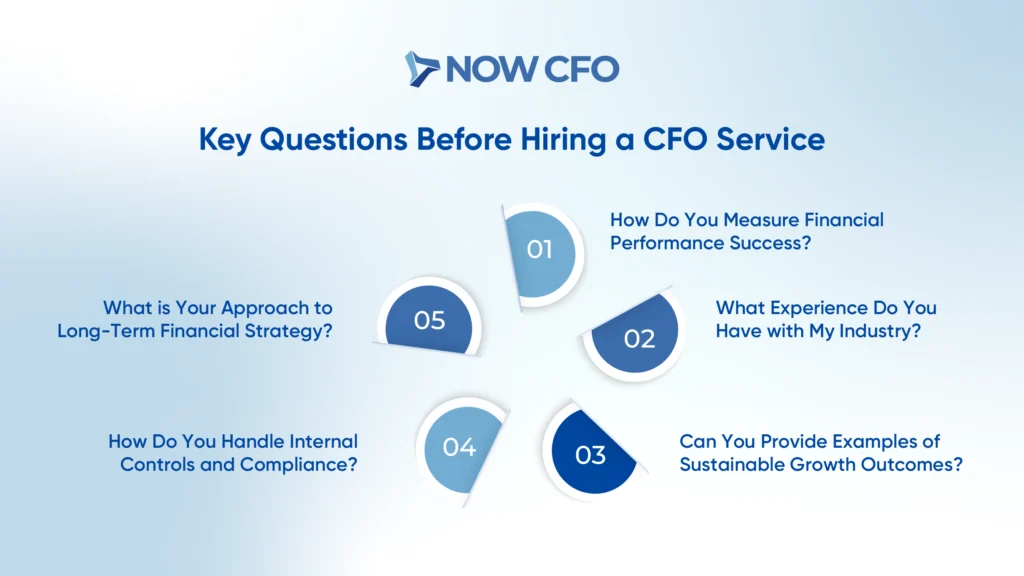
How Do You Measure Financial Performance Success?
Before you hire, you need to know certain CFO service selection criteria:
- They set measurable goals like liquidity ratios, profitability margins, and return on investment.
- Also, compiles current assets, liabilities, revenue, and costs to create a reliable starting point for measurement.
- Can also calculate metrics like operating margin and ROI to assess efficiency, liquidity, and investment returns.
- They track metrics like tracing 12‑month performance to reveal patterns.
- Revise performance measures as your strategy evolves.
What Experience Do You Have with My Industry?
With the right CFO services, you ensure your financial partner understands your industry’s financial flow.
List of core evaluation steps:
- Ask for industry-specific case studies.
- Assess the relevance of past roles.
- Request tailored scenarios.
- Validate through references.
How Do You Handle Internal Controls and Compliance?
If you have the right expert, you secure professionals who will add robust internal controls across your business. They align with recognized frameworks like the U.S. GAO’s Green Book and COSO.
Additionally, this will help to design a process that secures your operations, reporting, and compliance. Also, these services implement preventative controls, perform regular testing and monitoring, and adapt policies as regulations evolve.
What is Your Approach to Long-Term Financial Strategy?
When you choose the right CFO services, expect them to:
- Multi‑Year Financial Goals: Produce strategic plans that align with sustainable growth targets.
- Align With Strategic Planning: Use frameworks proven to deliver long-term value, innovation, governance, and resilience.
- Define Success Metrics: Incorporate ESG, operational efficiency, and innovation into financial performance measures.
- Maintain Agile Planning: Update forecasts regularly to reflect shifts in market, funding, or regulatory environments.
- Align Resource Allocation with Strategy: Allocate capital thoughtfully to R&D, expansion, and capabilities.
Common Mistakes to Avoid When Selecting CFO Services
A clear understanding of common missteps is essential to safeguard your financial strategy.
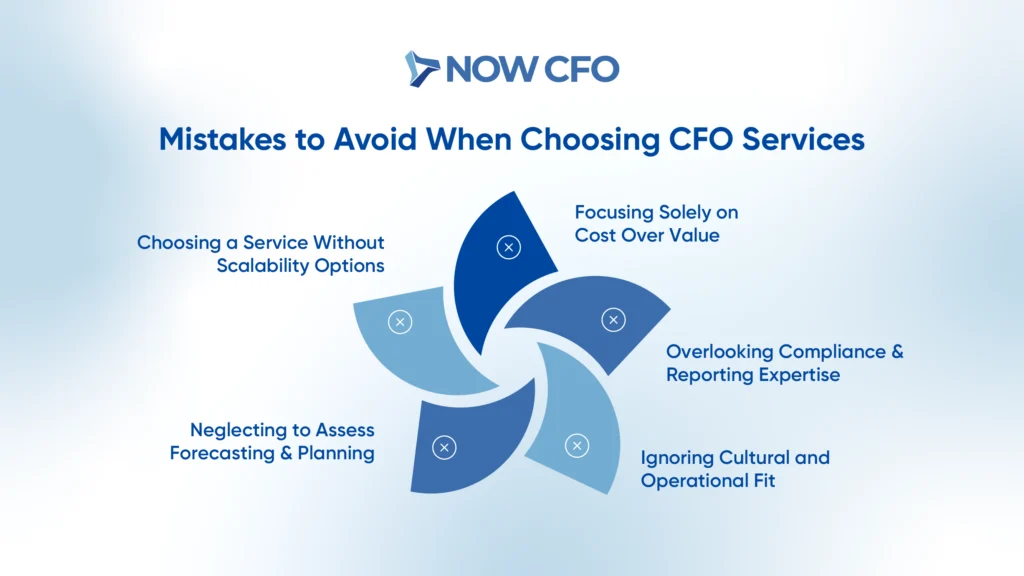
Focusing Solely on Cost Over Value
When you choose the right CFO services, you must avoid the trap of valuing cost over strategic impact. Because low-cost CFO options often prioritize budget, they wait to see your mileage while compromising on expertise.
Instead, leading CFO services deliver benefits that far exceed fees. This can include improved margins, stronger forecasting, risk mitigation, and compliance oversight. Additionally, 70% of businesses outsource to reduce costs.
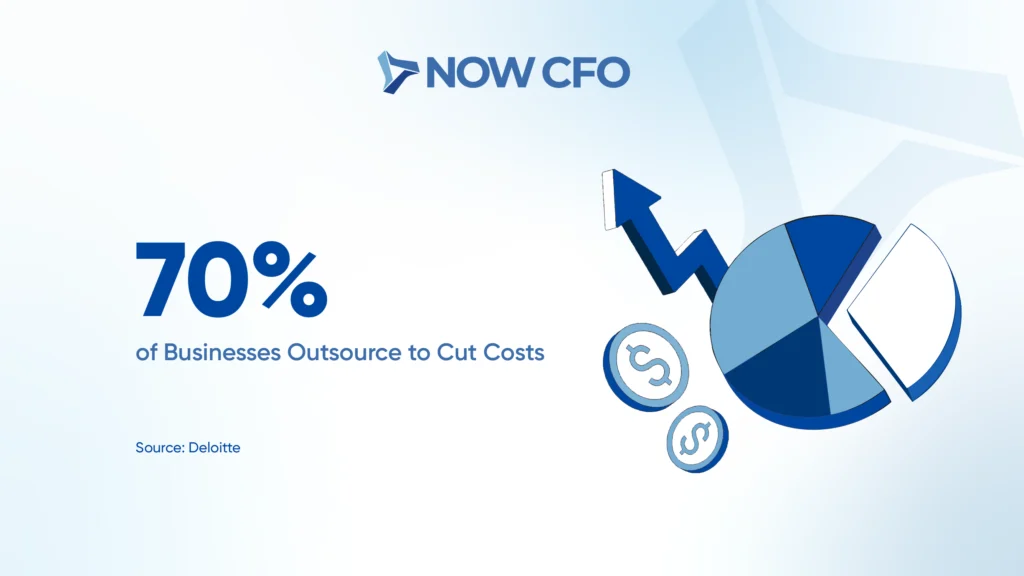
Overlooking Compliance and Reporting Expertise
Don’t underestimate the importance of compliance and reporting expertise when hiring CFO services. Because ignoring this area can expose your business to regulatory penalties, financial restatements.
A CFO expert in compliance builds processes aligned with GAAP, SEC standards, and tax obligations. They also align financial reporting with investor expectations and regulatory mandates.
Ignoring Cultural and Operational Fit
Always be mindful of the following alignment-focused expectations:
- A CFO whose values mirror your organization, creating a clear and shared purpose.
- Your CFO should align with workflows, decision cycles, communication, and team dynamics.
- Use behavioral scenarios or value-based interviews to evaluate alignment with your corporate culture.
Neglecting to Assess Forecasting and Planning Capabilities
If your business relies on intuition, then there is a high risk of missing revenue targets. Therefore, thoughtful forecasts and adaptable plans prevent missteps by aligning strategy with market reality.
Moreover, they drive bold actions in budget adjustments, hiring decisions, and capital allocation. Besides, forecasting remains a core planning tool, essential for maintaining fiscal discipline and informed decision-making in budgets.
Choosing a Service Without Scalability Options
Are you thinking of choosing the right CFO services? Then you need to verify that they offer scalable solutions. They should also be capable of growing with your business. Because companies that fail to implement scalable financial infrastructure often hit complexity.
Besides, growth without foresight can derail even high-potential enterprises. Whereas a scalable CFO service embeds flexible structures, data systems, forecasting models, and workflows. This expands alongside revenue, headcount, or operational reach.
Conclusion
To choose the right CFO services means to select a partner who contributes to both day-to-day financial operations and your long-term vision. A strategic CFO advisor delivers far more value than cost savings alone.
If you want to take the next step, consider a free consultation at NOW CFO. You’ll get a tailored diagnostic of your financial infrastructure, or even a pilot engagement to experience the impact firsthand.
Small and mid-sized businesses face daily operational demands while needing long-term financial vision. Knowing the difference between CFO services and accounting services is essential.
A solid base in accounting services for SMEs includes bookkeeping, payroll, and compliance, ensuring clarity. Adding CFO services brings strategic forecasting, capital planning, and sharper decision-making.
Understanding Accounting Services
A clear grasp of accounting services helps business owners maintain financial accuracy and make informed operational decisions.
The Core Functions of Accounting
Accounting involves a structured system of recording and managing financial transactions that form the backbone of business integrity.
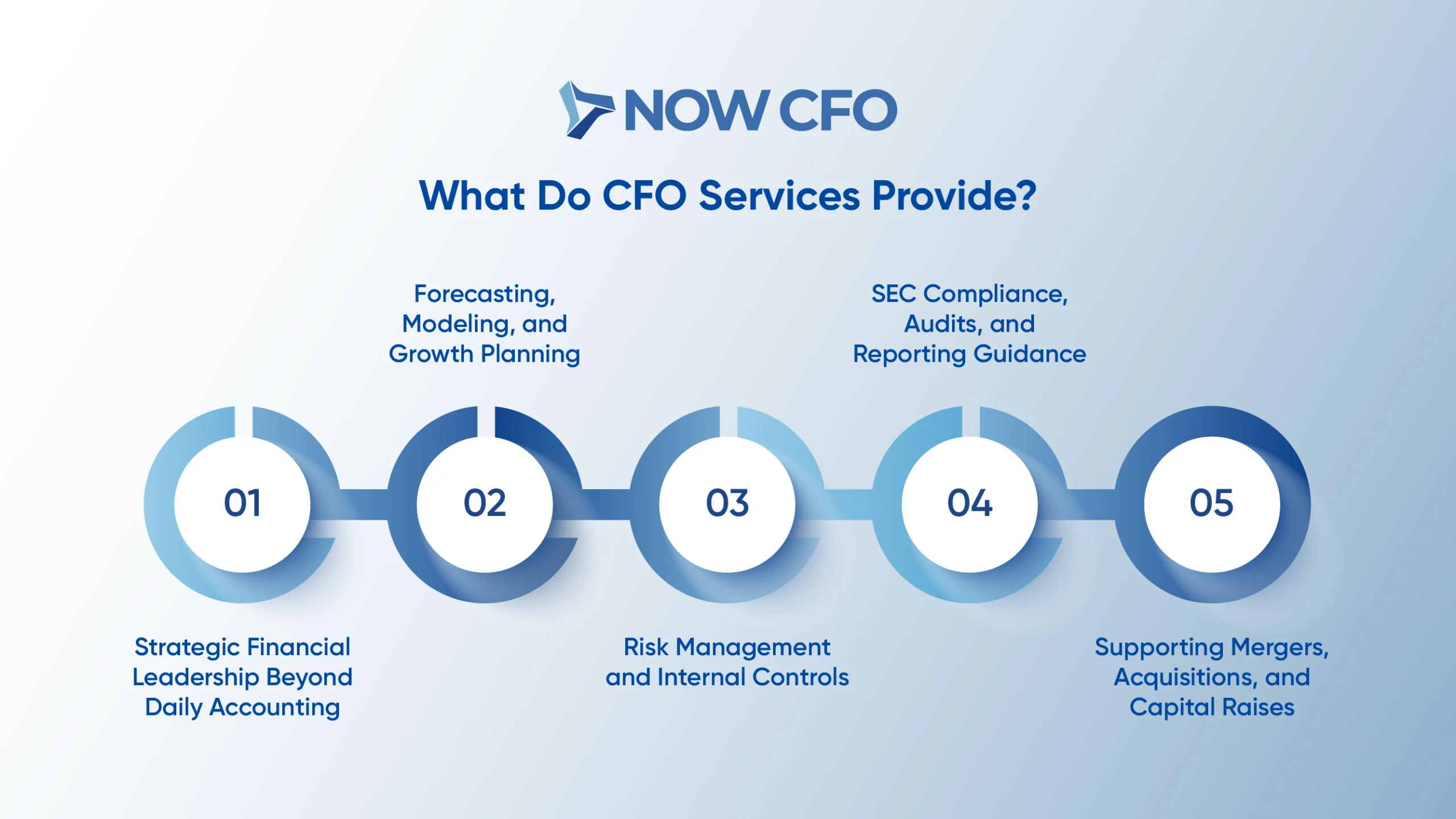
Bookkeeping, Payroll, and Transaction Management
Bookkeeping, payroll, and transaction management are the three pillars of business finance. They ensure real-time financial tracking, employee compensation compliance, and transaction visibility.
Financial Statement Preparation and Compliance
Accountants are responsible for preparing accurate financial statements, like balance sheets, income statements, and cash flow statements.
- Professionals assemble statements that are compliant with GAAP and regulatory requirements.
- Financial statements are prepared through internal and external audits.
- Accountants apply internal controls over data integrity, from verifying ledgers to conducting variance analysis.
- Compliant reports help leaders accurately assess performance, plan budgets, and model finances.
- Investors and lenders use financial statements to assess credibility, growth potential, and funding decisions.
Tax Preparation and Reporting
Accurate tax preparation and reporting are essential parts of accounting services for small businesses.
Accounting teams handle several key responsibilities with precision:
- Prepare and file federal, state, and local tax returns promptly and accurately.
- Identify eligible deductions and credits to optimize tax liability legally.
- Respond to IRS notices and maintain communication to resolve issues efficiently.
- Organize receipts, invoices, and logs to substantiate tax filings during audits.
- Monitor and adhere to all tax due dates to avoid fines and interest.
Importance of accurate record-keeping in business operations
Record-keeping enables businesses to monitor growth, quantify performance, and ensure legal compliance. Good records help track deductions, monitor growth, and support accurate tax filings.
Additionally, organized records increase access to funding, as lenders prioritize transparency. Accurate records enable CFOs to implement effective strategic financial management.
What Do CFO Services Provide?
CFO services provide strategic oversight to guide business growth and financial health. They go beyond routine accounting by focusing on forecasting, risk management, and long-term planning.
What Do CFO Services Provide?
- Strategic Financial Leadership Beyond Daily Accounting
- Forecasting, Modeling, and Growth Planning
- Risk Management and Internal Controls
- SEC Compliance, Audits, and Reporting Guidance
- Supporting Mergers, Acquisitions, and Capital Raises
Strategic Financial Leadership Beyond Daily Accounting
A fractional CFO delivers strategic financial leadership beyond daily accounting.
CFOs lead in several pivotal areas:
- Creating financial forecasts and models that anticipate future performance and support decision-making.
- Leading capital planning, like capital expenditure, budgeting, and funding strategies that align with growth targets.
- Enhancing internal controls and risk management, reducing vulnerabilities, and building trust.
- Guiding external stakeholder communication, including lenders, investors, or board-level reporting.
- Supporting major financial events like M&A and capital raises.
Forecasting, Modeling, and Growth Planning
CFOs elevate business performance by delivering accurate forecasting, modeling, and growth planning.
Detailed responsibilities include:
- Create short and long-term projections to anticipate revenue, expenses, and cash flow.
- Construct dynamic modeling tools for scenario planning and investment analysis.
- Set goals and resource plans supporting scalable expansion and funding needs.
- Evaluate best-case and worst-case scenarios to manage uncertainty proactively.
- Ensure that financial projections reflect the business’s vision and operational capacity.
Risk Management and Internal Controls
Small businesses face heightened vulnerability. 29 % of reported fraud cases involve small businesses, most of which are linked to weak internal controls..
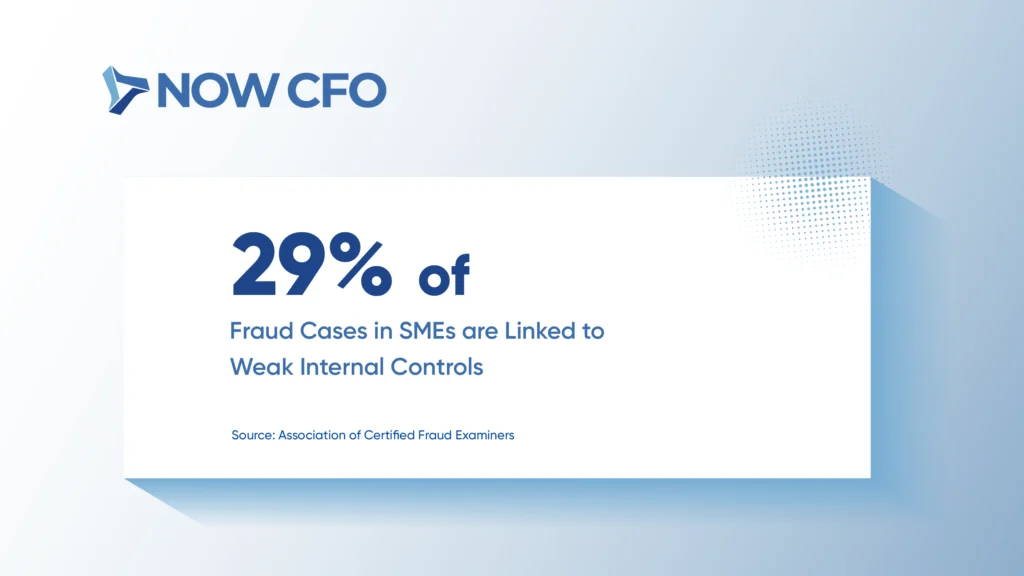
Accountants and owners implement key control measures through structured actions:
- Segregating duties to reduce fraud risk and enhance oversight.
- Monitoring transactions continuously to identify discrepancies promptly.
- Establishing approval protocols that enforce dual sign-offs on payments and expenses.
- Implementing audit trails to track changes and maintain documentation integrity.
- Conducting periodic risk assessments to adapt controls as operations evolve.
SEC Compliance, Audits, and Reporting Guidance
CFOs ensure SEC compliance, audits, and reporting guidance to business owners.
CFOs typically lead the following responsibilities:
- Complying with SEC requirements such as Form 10-K, 10-Q, and Regulation S-K disclosures.
- Coordinating external audits to validate financial statements, internal controls, and compliance.
- Implementing Sarbanes‑Oxley Protocols, including internal control reporting.
Supporting Mergers, Acquisitions, and Capital Raises
Accounting service providers for SMEs handle data integrity and reporting. CFO services enable capital strategy and transactional execution.
Here are key roles CFOs fulfill:
- Design an optimal mix of debt, equity, or hybrid funding to support recapitalization or acquisition.
- Prepare financial models, forecasts, and due diligence materials.
- Lead term sheet discussions, pricing, and covenants to optimize capital terms.
- Align acquired entities operationally and financially.
Learn More: What are CFO Services?
CFO Services vs. Accounting Services: Key Differences
To grasp how the difference between CFO and accounting services plays out in practice, it’s essential to compare how their roles diverge.
Tactical vs. Strategic Financial Roles
The table below highlights how tactical execution by accountants differs from the strategic leadership provided by CFOs.
| Tactical Financial Roles | Strategic Financial Roles |
| Managing ledgers, payroll, and invoices | Guides budgeting and anticipates performance gaps |
| Immediate accuracy and efficiency in financial data | Translate numbers into strategic narratives for investors and board members |
| Prepares regulatory filings, tax documents, and financial statements | Analyze trends, support capital raising, and steer M&A initiatives |
| Enforces transaction validation and reconciliation | Design and monitor internal controls, ensuring scalable integrity |
Operational Record-Keeping vs. Decision-Making Insight
A clear distinction emerges between the daily accuracy of operational record‑keeping and the forward-thinking role of decision‑making insight. One delivers compliance and clarity; the other fuels growth and strategic financial management.
| Operational Record-Keeping | Decision-Making Insight |
| Precisely record bookkeeping entries, ledgers, invoices, payroll, and reconciliations | Interpret operational data, forecast future scenarios, and shape long-term budgeting decisions |
| Ensures timely tax filings, regulatory reports, and balance sheet accuracy | Deliver insights on capital allocation, risk management, and mergers or fundraising |
| Provides daily visibility into cash flow, expenses, and liabilities | Transform numbers into strategic stories for investors, boards, and partners |
Compliance-Driven vs. Growth-Focused Approach
Compliance-driven orientation focuses on regulations and filing requirements, while a growth-focused approach prioritizes strategic expansion, forecasting, and capital optimization.
| Compliance-Driven | Growth-Focused |
| Ensures timely tax filings, licensing, and audit readiness, minimizing legal risks | Develop long-range forecasts, budget models, and growth plans |
| Produces required reports like financial statements and tax filings | Interpret KPIs, control metrics, and leverage insights to drive profitability |
| Focuses on error minimization, internal controls, and compliance accuracy | Evaluate ROI, fundraising, mergers, and resource allocation |
Internal vs. External Stakeholder Communication
Understanding the difference between CFO and accounting services means seeing how communication strategies vary between internal and external parties.
| Internal Stakeholder Communication | External Stakeholder Communication |
| Accounting relays daily figures, cash flow updates, and payroll details to internal teams | CFOs convey financial performance, forecasts, and strategic plans to investors, regulators, and partners |
| Supports internal departments (HR, operations, sales) with budgets and compliance details | Deliver timely, credible insights to external stakeholders to build confidence and support decision-making |
Short-Term Reporting vs. Long-Term Financial Strategy
It’s essential to compare how short-term reporting ensures operational control, while long-term strategy drives vision, investment, and sustained growth.
| Short-Term Reporting | Long-Term Financial Strategy |
| Monthly and quarterly financial reports | Multi-year forecasting and growth planning |
| Cash Flow tracking and budget variance analysis | Strategic capital allocation & scenario modeling |
| Regulatory and compliance reporting on a timely basis | Performance metrics and KPI alignment with long-term objectives |
Do Businesses Need Both CFO and Accounting Services?
Balancing daily financial operations with strategic oversight often requires accounting and CFO expertise as businesses grow.
When Startups May Only Need Accounting
Startups often begin by handling finances internally or with an external accountant. Most startups start with basic financial needs, like bookkeeping, payroll, and tax compliance. Without complex operations, they benefit from accounting services rather than a CFO.
81.7% of U.S. small businesses are nonemployer firms, which limits the need for financial strategy or executive-level support. With straightforward finances, startups can manage well without forecasting, capital planning, or investor communication.
When do Scaling Companies Require CFO Services?
As companies grow, the need shifts from basic accounting to strategic oversight. Here are key moments when scaling businesses require CFO services:
- Pursuing growth or expansion.
- Raising capital or seeking investors.
- Managing complex cash flow and budgets.
- Facing increased regulatory demands.
- Needing a financial strategy, not just reporting.
How CFO and Accounting Roles Complement Each Other
In effective financial management, the CFO and accounting operate hand-in-hand. Accounting ensures accurate day-to-day tracking, while CFOs analyze that data.
Accounting maintains clean, compliant records, such as ledgers, reconciliations, operational reporting, and tax submissions. It also ensures that businesses meet regulatory requirements and maintain visibility.
CFO services leverage these records as a foundation to forecast, manage cash flow, and evaluate expansion opportunities. Then, CFOs present strategic insights to stakeholders, embodying strategic financial management.
Industries Where Both Services are Essential
Specific industries face complex financial demands requiring tactical accounting and strategic guidance. These sectors often need both CFO and accounting services:
- Healthcare and professional services, like law and consulting.
- Manufacturing and logistics.
- High‑growth or capital‑intensive companies.
- Nonprofits and organizations with multiple stakeholders.
Building a Balanced Financial Team with Outsourced Solutions
Below are key reasons why assembling a balanced financial team with outsourced solutions is invaluable:
- Outsourced financial professionals access strategic financial management as needed, saving overhead costs.
- Ensures depth and ongoing support, even as internal staff change or business needs shift.
- Outsourced providers make sure accounting services for SMEs remain accurate and compliant.
How NOW CFO Delivers Integrated Financial Expertise
NOW CFO elevates financial leadership by combining precision-level accounting with strategic expertise.
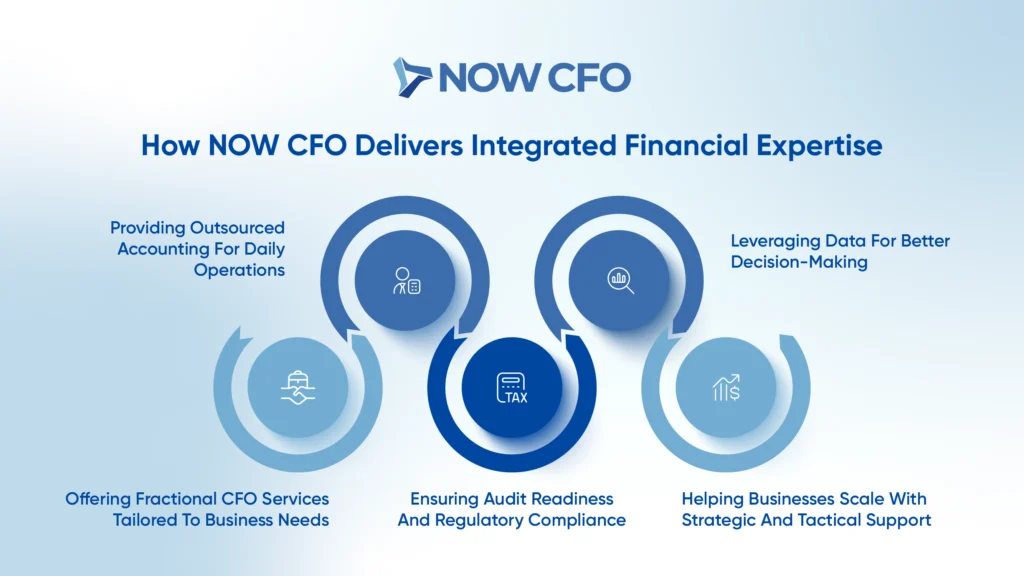
Offering Fractional CFO Services Tailored to Business Needs
Every business has distinct financial challenges, and a one-size-fits-all approach rarely delivers lasting results. Our fractional CFO services are structured to provide the right level of expertise at the right time.
1. Customized Engagement Model
NOW CFO aligns fractional CFO services with a company’s growth trajectory, providing strategic intervention when needed. A flexible structure underscores the difference between CFO and accounting services by delivering high-level expertise without full-time staffing.
2. Purposeful Budgeting and Forecasting
Our clients receive actionable insights through tailored budgeting, rolling forecasts, and cash flow guidance. These insights empower leaders to plan confidently and capitalize on opportunities with strategic financial management.
3. Enhanced Financial Controls and Reporting
We implement strong internal controls and improve financial reporting processes to ensure transparency, accuracy, and compliance. These enhancements transform routine financial data into clear, strategic insights that support better decision-making.
4. Crisis Navigation and Scenario Planning
Revenue fluctuations and market shifts demand agile financial leadership. NOW CFO’s fractional model offers on-call expertise to navigate these scenarios, ensuring resilient planning and adaptive decision-making.
5. Scalability with Cost-Conscious Oversight
Businesses pay only for the required expertise, avoiding fixed costs while gaining adaptive financial leadership. This cost-efficient approach aligns financial strategy with business growth without compromising on expertise.
Providing Outsourced Accounting for Daily Operations
Managing daily finances requires reliability and accuracy. Precision in routine financial operations is the foundation of an effective financial strategy.
NOW CFO delivers this through robust outsourced accounting:
- Accurate bookkeeping and transaction recording.
- Timely payroll, tax, and compliance management.
- Robust reconciliation and cash flow oversight.
- Strong internal controls.
Ensuring Audit Readiness and Regulatory Compliance
NOW CFO helps businesses implement internal controls, align financial operations with regulations, and monitor compliance. Our team prepares companies for audits via assessments, organized documentation, and audits.
Audit preparedness will prevent major disruptions, especially for SMEs. NOW CFO’s methodology eases this burden by integrating compliance within routine financial workflows. This not only supports audit readiness but also enhances long-term scalability.
Leveraging Data for Better Decision-Making
We leverage financial data to drive smarter, faster decision-making across all business levels. With actionable insights, we support strategic planning, forecasting, and performance tracking tied to key business objectives.
Our data-driven approach enables business owners to act confidently. Also, 44% of leaders rely on data analytics for most decisions, showing the growing importance of data in business.
Helping Businesses Scale with Strategic and Tactical Support
Here’s how NOW CFO helps companies grow by aligning accounting services for small businesses with leadership-level financial strategy:
- Fractional CFOs project future cash availability, helping businesses plan for hiring, product launches, or market entry.
- Ongoing financial analysis ensures spending aligns with company growth targets.
- Strategic advisors support equity planning, debt structuring, and investor relations.
- Routine financial tasks like invoicing, reconciliation, and payroll stay accurate and timely.
Conclusion: Choosing the Right Level of Financial Support
Accurate accounting builds a solid financial foundation, while CFO services provide the strategic guidance for growth. Together, they ensure both stability and direction.
NOW CFO offers complimentary consultations to help you determine the right level of support and take confident steps toward your business’s future. So, feel free to reach out and connect with our experts.